

Your Complete Guide to Optional and Reapplicant MBA Essays
Jul 11, 2022

UPDATE: This article was originally posted on July 6, 2018. It has been updated with new information and tips below.
Part of the difficulty of applying for business school is figuring out how to present yourself while painting a consistent picture of your personality and achievements throughout the process.
However, if your case is different from most — perhaps you’ve got a lower-than-average GMAT score, perhaps extenuating circumstances have forced you to apply in Round 3, or perhaps you’re reapplying to business school — you will find yourself needing to discuss elements of your profile that fall outside the traditional MBA application.
That’s where a special type of essay comes in: optional and reapplicant essays .
Done well, these essays can provide the additional context needed to give your application the edge it needs. If done poorly, your application is unlikely to move forward.
To help you make the most of these kinds of essays, we’ve compiled our expert tips to help ensure you use these “special” essays to their full advantage.
What is an optional essay and who should write one?
In the past, the optional essay section was often extremely open-ended, with questions like London Business School ’s optional question “ Is there any other information you believe the Admissions Committee should know about you and your application to London Business School? (this question is optional) (500 words). ”
This type of question was perfect for applicants to highlight another skill, activity, or experience that they wanted to share with the admissions committee but didn’t quite manage to squeeze in anywhere else.
How times have changed!
Not only have essay questions become shorter in general , the optional essay has become almost standardized across business schools.
Take Kellogg ’s optional essay from 2021, for example. The question asks “ If needed, use this section to briefly describe any extenuating circumstances (e.g. unexplained gaps in work experience, choice of recommenders, inconsistent or questionable academic performance, etc.) ”.
A nearly identical question is used for the optional essay prompt for most other top MBA programs, often with a limit of just 250 or 300 words .
The change in wording – and word limits – makes it clear that business schools do not want extra essays. They only want to hear about extenuating circumstances .
Considering the fact that anything you write will add additional work for your reader – who already has a lot of material to read through for every applicant – and how important it is to precisely follow instructions, you must truly reflect on whether or not your case needs explaining in an optional essay.
Good reasons to write optional essays include:
- A low GMAT score or poor academic performance
- Explaining your choice of recommenders
- Explaining any gaps or confusing jumps in your work experience
- Any relevant personal circumstances that have greatly influenced your application
Though it’s tempting to fill every box with information about why you are a great fit for your dream school, resist this temptation and make sure, first and foremost, that you follow instructions .
Really, though. There is no easier way to annoy the admissions committee than to flout their instructions. So make sure you really ask yourself, “Is my application truly incomplete without this information?”
Looking for example optional essays that cover a wide range of subjects? Our MBA Resource Center has dozens of successful sample essays, in addition to successful essays from countless schools, brainstorm guides, resume templates, interview mocks and answer models, and much more. Find out more about your one-stop shop for MBA application success here .

What does a “good” optional essay include?
In a word: brevity .
In some cases, the admissions officer reviewing your file has already read over 1,000 words before getting to your optional essay.
This means that they don’t need to read a novel about why your boss is not writing one of your letters of recommendation.
In most cases, a simple, straightforward explanation is more than enough to get the point across.
If you need to explain a shortcoming in your application – such as a low GMAT score – you also want to make sure to provide evidence that you are still well-suited to add value to your target school’s MBA program and show any relevant growth in the area of concern.

For example, despite building a challenging, high-performance career in the financial markets, our client João’s quant score on the GMAT exam was lower than ideal.
To show his score was not an accurate reflection of his abilities, he included this in his optional essay:
“First, I would like to address my low GMAT quantitative score. Math has never been a problem for me. As such, I chose to pursue a career in the financial markets, a very quantitative industry. I have been improving my math skills, mainly in statistics and probability, for more than 10 years at university and in my career. I have also done professional courses in derivatives and risk management, and have passed through the first two stages of the CFA certification process. As a result, despite my low score, I strongly believe that I have the quantitative skills necessary to thrive in the Michigan MBA program .”
Though this is slightly on the long side for an optional essay, the candidate had ample evidence to present to offset his less-than-stellar performance. In the end, the essay was enough to earn him an admissions offer.
Finally, be careful where you draw attention.
If your quant score on GMAT was 50 rather than an elusive, perfect 51, there is no need to explain this. More likely than not, the admissions committee member reading this optional essay will respond with an eye roll.
As such, think carefully about where your application and/or profile may be slightly below average for the school to which you are applying and address only these issues.
What is a reapplicant essay and who should write one?
Perhaps you applied to business school last year but weren’t quite able to land a spot at your dream school.
That doesn’t mean you should give up on your business school dream! We have worked with numerous reapplicants who have secured spots at Harvard , Columbia , and other elite MBA programs only the second time around .
As a reapplicant, however, you need to be conscious of the fact that you have a unique challenge that first-time applicants do not. First and most importantly, you must reflect on why you were not admitted the first time around.
Though there are many factors that go into play, some of the most common reasons a candidate is dinged are: a low GMAT, a lack of clearly-defined goals, and a failure to demonstrate fit with his or her target school.
As such, throughout your application, you must focus on showing the admissions committee how you have grown and evolved as a person and professional since your last application.
One of the most appropriate places to do so is in your reapplicant essay.
Let’s take a look at Columbia Business School’s prompt for reapplicants (especially critical given the fact that this is the only essay CBS allows reapplicants to submit).
The question states:

The question is perfect in its clarity. Columbia wants you to get to the point, showing them how you have grown and what your short-term and long-term goals are.
Though not all business schools ask the question in exactly the same way, your task is the same: show them the “new and improved you.”
Keep reading for our top tips on how to write this essay (including past successful essays) in the next section.
What does a “good” reapplicant essay include?
When writing your reapplicant essay, you must keep the word “delta” in mind.
Defined as the “ an increment of a variable ,” in your application, delta should be defined to mean the difference between old you and new you.
Though there are many ways to demonstrate “delta,” some of the most effective in a reapplicant essay include:
- A higher GMAT score
- Clarified or refined goals
- Additional leadership or managerial responsibilities at work
- Additional international experience
- New or additional community service experiences
Let’s take our client Pedro for example.
The year before putting the Ellin Lolis Advantage to work for him, he had submitted an application to Columbia Business School that, among its greatest flaws, did not state coherent goals. Though Pedro had built a strong finance career, he focused his post-MBA goals in his first application on launching an art gallery.
For the admissions committee, it was a bit too much of a jump, and Pedro was dinged without an interview.
After coming to us and critically reviewing his application , we developed a new line of attack that leveraged his company’s desire to sponsor his MBA and give him a leading role in expanding the company’s regional presence.
Furthermore, we focused on showing how he had sought to grow as a leader both at work and in the community to really reinforce the value he could bring to Columbia.
Here’s how he did that:
“Not being admitted to the Columbia MBA was a big failure for me, though I can now see it was important, as it helped me realize what passion to follow, where I needed to improve, and what I needed to do to accomplish these things. Thus, I took steps to come closer to reaching my goals.
After going through a process of self-reflection and talking to many people, including the president of BANK, I realized that the bank has many opportunities for development, and not just in Brazil. BANK’s expansion throughout Latin America will require home-grown talent that is able to implement our DNA in a way that is compatible with local cultures and business practices. I want to play an important role in this process in two different ways. By acting as a connector, I will establish relationships with local players and open new markets to Brazilian companies. By building an adequate organizational structure, I will help prepare and manage our future leaders in this task.
Having decided on my goals, I started working on my own development. Professionally, I improved my negotiation skills when helping clients avoid default in the current economic environment. Although I still don’t directly manage people, I formally took action in the bank’s institutional recruiting and coaching of interns. Additionally, I engaged in two external consulting projects to restructure the bank’s commercial department. These projects gave me greater insight into the areas of general management and organizational planning.
Although I decided not to pursue the arts as a career, it remains a strong passion of mine. Therefore, I have continued to run and improve my volunteer organization “Integrarte,” which takes underprivileged children to museums to increase their interaction with art. Recently, I have taken steps to add an arts education component to the initiative and have been developing a methodology to scale the project with NGOs using a feasible, low-cost model. I believe that combining business skills with an inner passion for arts can help me continue to share this passion and impact others.
Now that I am sure where I am going, the Columbia MBA is even more essential to enable my growth. I am looking forward to hearing Carlos Brito talk about the challenges of transforming a local company into a global giant. Also, attending classes such as “The Future of Financial Services” and “Napoleon’s Glance” will help me better understand the financial industry and improve my decision-making skills for the future. Outside of the classroom, I am excited to participate in the Arts and Culture Club and am interested in organizing a trip to Inhotim in Brazil to explore the combination of arts and social empowerment.
Lastly, I also expanded my network of contacts, getting in touch with CBS alumni and current students, such as XXXX (Class of ‘XX), a close friend of mine. This enabled me to get to know the school even better and has only reinforced that Columbia is the best possible fit for my post-MBA goals. It is the only school that provides the combination of learning specific concepts of finance from top-level faculty and contact with people from all around the globe in a city where the cultural and professional possibilities are truly limitless.”
In your own reapplicant essay, you should similarly discuss how you have overcome any weak spots in your application and provide evidence that reinforces your strong interest in your target MBA program.
Furthermore, if you have visited the school since you last applied, you may want to include a mention of how this visit shaped your view of the school and what it offers. Though we don’t feel that simply adding, “I visited campus earlier this year,” adds much value, showing the school the insights that you gleaned from attending classes and interacting with students – and how these insights reinforced that the school is the best fit for you – can definitely make your reapplicant essay more compelling.
With those elements in place, you will be well on your way to reaching your long-awaited goal of attending an elite business school.
Ask for an outsider’s perspective
Self-reflection of any type is challenging.
It can be a complex task to identify weaknesses in your profile – reapplicant or not – and then develop a surgically precise strategy to address these weak spots and how you’ve worked to overcome them in your application.
If you’re not sure exactly how to do this, we’d be happy to help you make this critical decision .
At Ellin Lolis Consulting, we pride ourselves on offering personalized solutions to ensure you tell your best story. Perhaps that’s why we have a 98.9% success rate in placing comprehensive consulting clients in top business schools around the world.
As our client – and successful CBS reapplicant – Pedro Kuczynski said, “ In a nutshell, Ellin Lolis Consulting is the X factor in preparing for any MBA. ”

Want to put the Ellin Lolis Advantage to work for your admissions essays? Find out more about our team of expert MBA essay editors here .
Real MBA Essays That Got People In
School-specific sample essays that got our clients accepted
Get Access Now

98.9% Success Rate
With our expertise and 98.9% success rate in placing our consulting clients in at least one of their target schools, we can add more value to your application than you ever thought possible.
Recent Articles

Ellin’s Top 7 Tips #1 – Your MBA Goals Essay
Apr 25, 2024
UPDATE: This...

How To Get Into Harvard: 3 Things You Need To Show
Apr 17, 2024
The Habit of Leadership: Beyond the Roles You've Held Analytical Aptitude: Communicating Complexity With Clarity Engaged Community Citizenship Customizing Your HBS Application Make Sure You Prepare a Successful...

Essay Editing Tips from the Pros: Preparing for Your MBA Journey
Mar 14, 2024
Importance of Essay Editing in MBA Applications Common Mistakes to Avoid in MBA Essays Strategies for Effective MBA Essay Editing Understanding the MBA Essay Requirements Key Elements of a Strong MBA Essay...
Ready to start your MBA Success?

Tips for Tackling the MBA Reapplicant Essay

Rejected from your dream business school? While rejection can be discouraging, do not give up: Personal MBA Coach successfully guides MBA reapplicants every year.
And do not worry – even though your previous application(s) may be kept on file to assess your growth, MBA reapplicants receive unbiased evaluations just like everyone else. As Harvard Business School asserts, “reapplicants do not have an advantage or disadvantage in comparison to other applicants.”
Business schools do, however, require candidates to wait until the following year to reapply, providing ample time for you to take a step back and revise your application.
Each school handles reapplicants slightly differently. For some schools, the reapplicant application is unchanged. For others, along with changing application components, you may also have to answer a reapplicant essay question. MBA Reapplicant essays help the admissions committee understand how you have evolved personally and professionally between the time of your rejection and your reapplication.

For example, Columbia Business School requests that applicants detail their progress and reiterate their MBA goals:
How have you enhanced your candidacy since your previous application? Please detail your progress since you last applied and reiterate how you plan to achieve your immediate and long-term post-MBA professional goals. (500 words maximum)
Wharton, whose reapplicants make up approximately 10% of their applicant pool in any given year, poses a similar reapplicant essay question but with a shorter word limit:
Please use this space to explain how you have reflected on the previous decision on your application and to discuss any updates to your candidacy (e.g., changes in your professional life, additional coursework, and extracurricular/volunteer engagements). You may also use this section to address any applicable extenuating circumstances. (250 words maximum)
Kellogg frames its reapplicant essay question in a slightly broader sense than do Columbia Business School and Wharton:
Since your previous application, what steps have you taken to strengthen your candidacy? (approximately 250 words)
Taking an even more general approach, MIT Sloan asks the following, allowing applicants to respond to this question however they see fit:
Please let us know what’s changed since you last applied. (1000 characters maximum)
Regardless of the question, your general strategy should be the same. Here are four key tips for tackling MBA reapplicant essays:
1) Answer the question – directly!
While it can be tempting to spend the whole essay professing your love for a given business school, focus on what the question asks! Showing passion and interest is important but desire to attend is only one driver of success. Instead, tell the schools about your growth or goals.
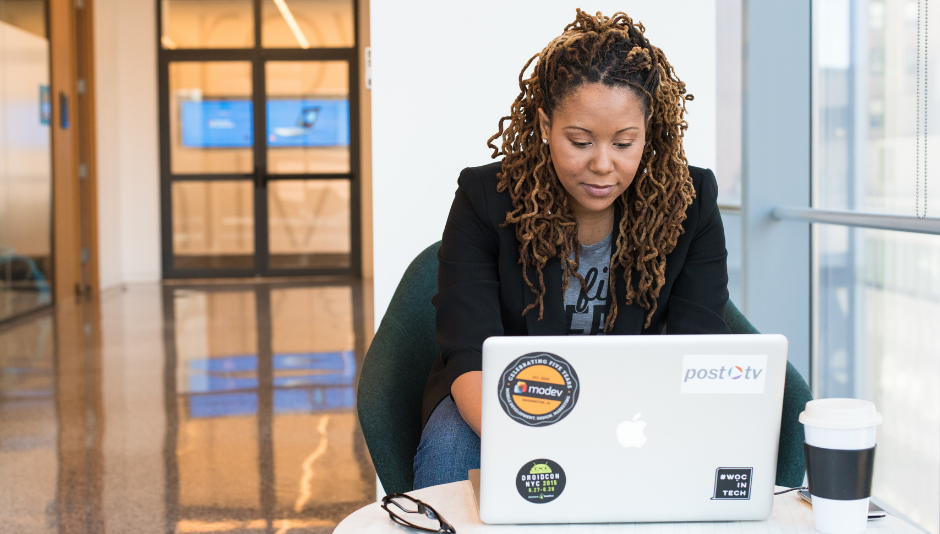
2) Be specific.
Most reapplicant essays ask candidates to demonstrate growth. Remember, past actions are the best indicator of future performance, so be sure to share very specific examples of growth.
3) Consider both personal and professional growth.
While of course it would be great if you were promoted since your last application, this is not essential. You can grow professionally within an existing role by taking on additional projects or changing your approach. In addition, for some candidates, personal growth can be more important than professional growth. Consider weaknesses you have addressed or extracurricular roles you have taken on.
4) Do not dwell on the previous application.
Sometimes reapplicant essays focus on what they think went wrong during the previous application. This is not the most effective strategy. Instead of apologizing, focus on the positive. Convince your readers how you are a better applicant, using the tips noted above.
Need help with the MBA reapplication essay?
MBA Reapplicant essays are included in all Comprehensive Packages. While time is running out for round 2, Personal MBA Coach will take on a limited number of highly motivated clients over the next week or two.
You also may like these other blog articles:

Find out why we are consistently ranked #1. Sign up for a 30-minute consultation today!
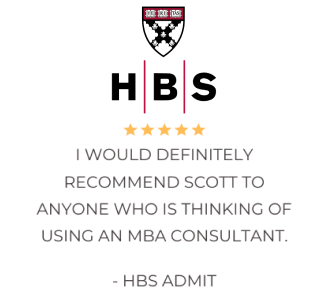
We have over 200 5 Star Reviews. Find out WHY!
schedule consultation
- Menlo Coaching
- How to Get Into a Top MBA
MBA Reapplicant Tips & Ding Analysis, w/Case Study
Being dinged from your first-choice MBA programs can be demoralizing, but it doesn’t mean that you can’t win admission when you re-apply. If you diagnose your weaknesses accurately and take the right steps, both to strengthen your profile and strengthen your application materials, you can be admitted.
Let’s start off with some of the basic questions that you, as a reapplicant, might have about your prospects.
Is it Good to be an MBA Reapplicant?
There are a lot of stories out there about the success that MBA reapplicants have had. From this anecdotal evidence, it may seem like MBA programs are, in fact, biased in favor of reapplicants. However, this is not true.
The success of reapplicants is actually a kind of survivorship bias — the pool of people who are motivated to reapply are also the ones who are willing to take steps to strengthen their application and candidacy, including things like:
- Retaking the GMAT and getting a better score
- Earning a promotion at work
- Improving their post-MBA career plans
- Spending more time networking with their target MBA programs
An MBA program’s attitude toward reapplicants could be summarized as “What’s different this time around?” Taking actions like the ones above provides a very satisfactory answer to this question. You will, in fact, answer exactly this question when writing your reapplicant essay.
MBA programs like to admit applicants who know how to work hard and improve themselves, since it shows the potential to work hard in classes and on post-MBA recruiting. Schools do NOT admit reapplicants just because they admire their persistence.
What Should I do Differently as an MBA Reapplicant?
The first rule of reapplications is: don’t fix it if it ain’t broke . You can drive yourself crazy rewriting and fine-tuning everything about your profile in the hopes of sending something “different” out. This is not the best use of your time.
First of all, you should know that the schools won’t begin by reading your old applications. They’ll pull those files if and only if your current application appeals to them. MBA admissions officers are VERY BUSY people and don’t have the time to do even one iota of unnecessary work.
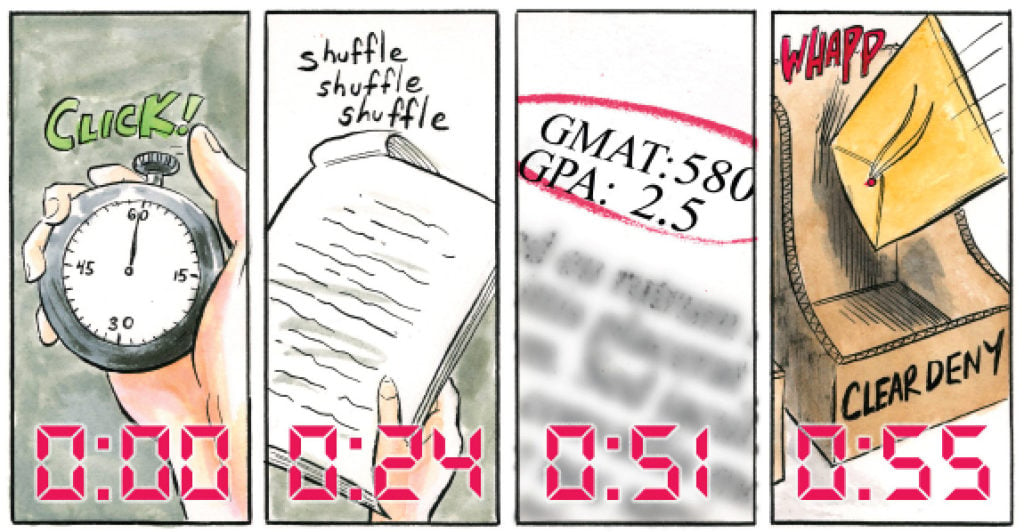
This is wonderful, because it means that you have the freedom to fix your errors this time around, and you can be confident that if the admissions reader pulls your old file, it’s precisely because they liked what they see in the current year’s file.
What you should change depends on why your application was rejected in the first place.
The Ultimate MBA Admissions Checklist
Our free, comprehensive checklist covers everything you need to shop for an MBA admissions consultant.
✓ Compare pricing across 35+ MBA admissions consulting firms
✓ Learn why “success rates” are not to be trusted
✓ Find the right service model for your needs
✓ Prep for your consultation calls
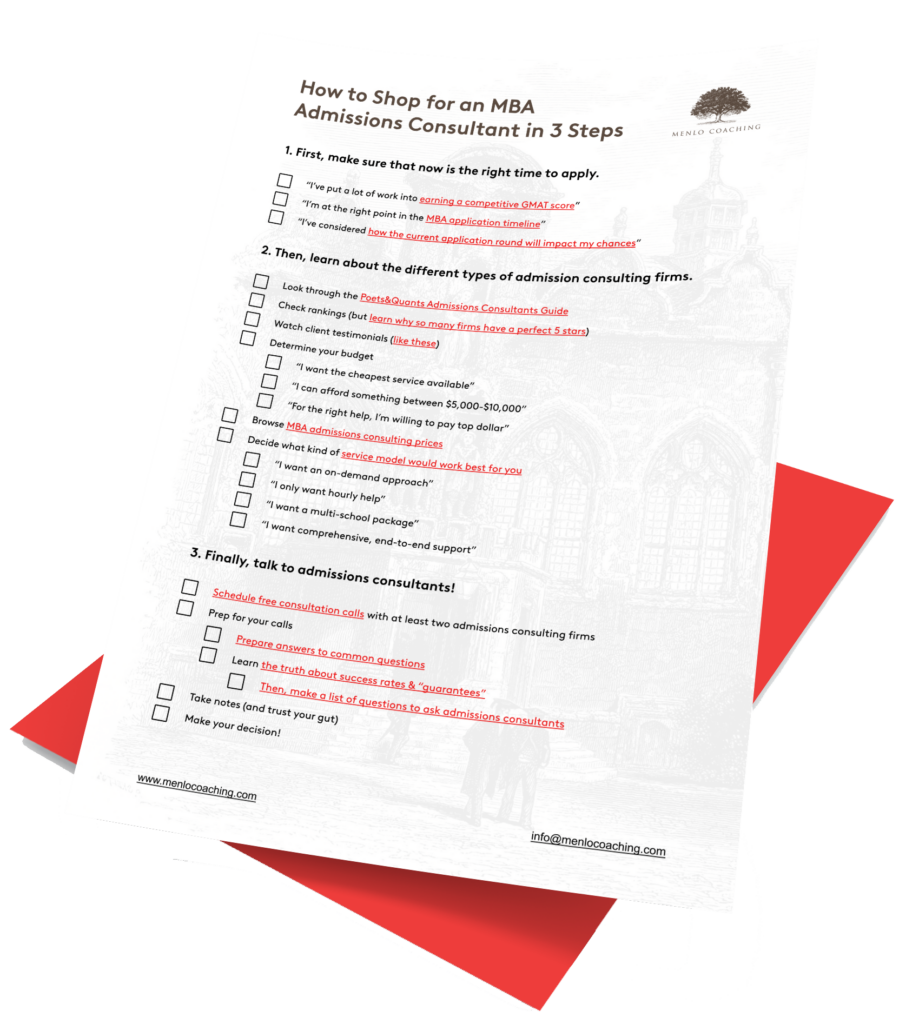
Feedback From Schools
You may be tempted to ask schools for feedback… but when was the last time that you got honest, useful feedback after a failed job interview? While it makes sense to take advantage of any formal feedback sessions offered by the schools (e.g. HBS, Tuck, Darden), feedback from schools is typically cryptic and non-committal. “It was a really tough decision! We had a strong applicant pool this year.”
Common Reasons for MBA Applications to be Rejected
What you can do instead is to familiarize yourself with MBA applications and admissions guide/criteria and compare yourself against those. Some of the most common reasons for rejection from an MBA program include:
- Your GMAT or GPA is too low. As you may know, GMAT and GPA are important parts of the ranking methodology at publications like U.S. News, so schools consider both your ability to handle the coursework, and the potential impact of your scores on the school’s average. We explain how to answer the question Is Your GMAT Score Good Enough? in a separate article.
- You might have applied to the MBA program prematurely. A few applicants sneak in with three years of work experience upon matriculation, but this is most common for applicants who are sponsored and have a guaranteed return offer. For everyone else, having 4 or 5 years of work experience upon enrollment is recommended. For a more detailed discussion about this, see our MBA applications and admissions guide .
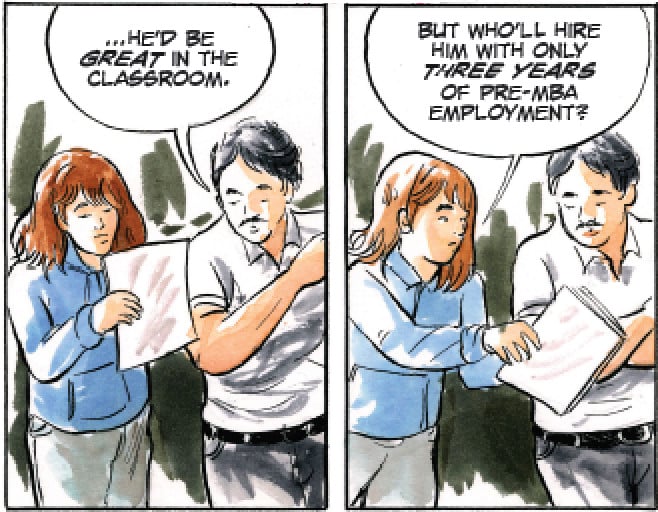
- Your career goals may have been unclear or unrealistic. Schools want you to pursue meaningful work that brings out your best, and the strongest career goals present a story that is both inspiring and practically achievable.
- You might have failed to research your target MBA programs thoroughly, giving them the impression that you applied only because of the school’s ranking.
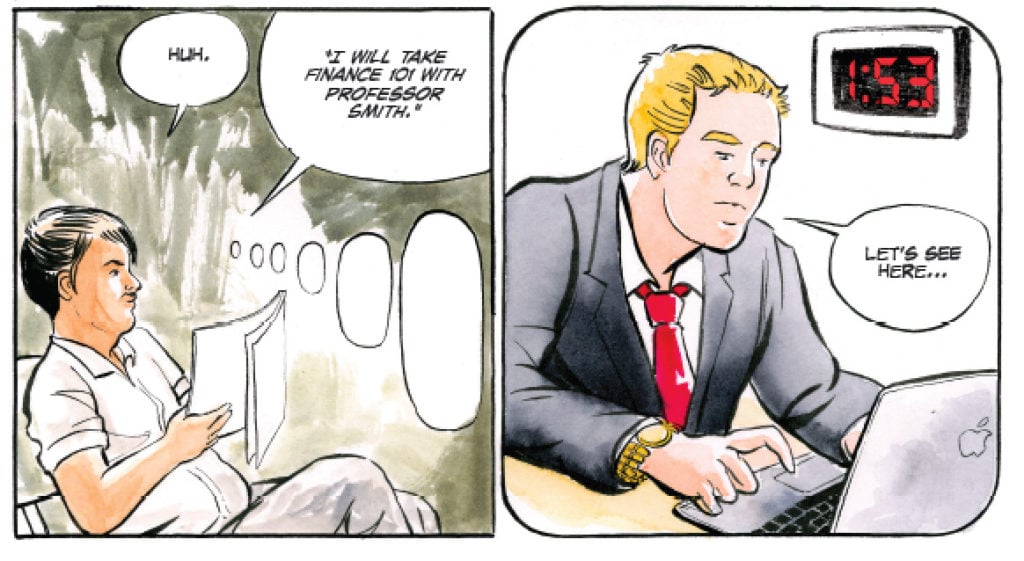
If you are a serious reapplicant, we’d be happy to give you honest feedback on your previous applications. Contact us , and submit your previous applications confidentially to [email protected] .
MBA Reapplicant Case Study
We worked with a reapplicant who had previously applied to several top schools. She had gone to a good undergraduate program, had a good GPA, a good GMAT score, worked for a good employer. Basically, she had everything she needed to be a successful MBA applicant. The problem was her career goal:
Becoming a management consultant specialized in the FinTech industry.
This career goal showed the admissions committee reader that she hadn’t done basic research about her career goals.
- Consulting firms hire MBA graduates as generalists, not as specialists
- There are very few consulting engagements with FinTech companies. At the time that she applied, most Fintech companies were VC-backed startups and didn’t have the budgets to hire a firm like McKinsey or BCG.
So, we put most of our time and energy into working with her on her career goal. In her reapplications, she stated a goal to begin her management consulting career as a generalist and explained why that was motivating to her. She also put a lot more emphasis on the amount of research she had done by networking with current management consultants and highlighting that she had worked hard to understand their job.
It was important for her application to show that she had invested a lot of time in this process of researching consulting jobs (and hadn’t just hired a better admissions consultant who told her to “make these changes”). So, in her application, she admitted openly in her reapplicant essay that she had failed to sufficiently research her career goal in the previous year and owned this mistake. She discussed using the Forté Foundation career-oriented forums, and speaking to other successful women in the industry while drawing parallels to how she might be successful by taking their advice.
This particular applicant, with no change in her job or GMAT score, was accepted to her first choice: Columbia Business School. The second time was the charm!
In this case, the career goal was the key issue, but your case may be different. if you are considering re-applying, and you want our opinion on that, please fill out our form , submit your old application materials confidentially to [email protected] , and we will respond to you shortly thereafter.
Unlock success in your M7 application journey with insights from our experienced MBA admissions consultants .
Related Articles
- The Complete Guide to MBA Applications
- What Are Your Chances at Top B-Schools? MBA Admissions Calculator
- Finding the Right MBA Admissions Consultant : 4 Industry Secrets
How to Write a Powerful MBA Essay—With Examples
The MBA essay is critical to your business school application. Read our guide to writing the perfect MBA essay, with successful admit examples.
Posted April 4, 2024

Featuring Avi L.
MBA Personal Statement Workshop: Tips & Pitfalls
Wednesday, may 1.
6:00 PM UTC · 60 minutes
Table of Contents
What is the mba essay.
The MBA admissions essay.
Those words alone are enough to make most MBA candidates run screaming. Writing in general is hard enough. Writing about why you want an MBA? Your short-term goals and career aspirations? What matters to you most, and why? Forget it.
Of course, you still have to write these essays.
The MBA essay is perhaps the most important part of the business school application. (It's also getting more and more important by the day, with some business schools moving away from traditional, quantitative measuring sticks, like the GMAT and the GRE.) Every other part of the application — your GPA, your test scores, your letters of recommendation — are quantified, cut and dried, or out of your control. The essay is your chance to show up as a fully realized MBA candidate, with hopes, dreams, and vulnerabilities. Admissions committees are not simply assessing your candidacy as a future leader — they're looking to admit human beings. That's where the MBA applicant essays come in.
That being the case, rather than being intimidated by it, treat the essay like the opportunity that it is — the chance for you to highlight your unique, iridescent self; the only moment in the MBA admissions process (prior to the interview) when you can speak directly to the admissions officers; the time when you'll show them who you really are. It's not easy to write something that will do that, of course, but with the tips and tricks in this guide, and some help from one of Leland's vetted, world-class admissions coaches, we know you can do it. Give the essay the time, attention, and respect it deserves, and you'll be on your way to an offer of admission at your dream school.
Without further ado, let's dive in!

Ultimate MBA Essay Guide
See the MBA essay prompts, top tips from experts, and real examples from admits with this comprehensive guide.
How Long Will My MBA Essay Take?
First thing's first: let's talk about timing.
The MBA application is a behemoth; between exams, resumes, gathering your official transcripts, letters of recommendation, and the applications themselves, there's a lot to juggle. That being the case, we suggest you give yourself ample time to draft, write, and revise your essays. The last thing you want is to be rushed to the finish line.
So, give yourself at least three months to write your MBA essays. That should allow you ample time to draft, write, and edit. For more information on timing your entire b-school application, click here for A Comprehensive MBA Application Timeline--With Chart .
Now, on to the critical question:
Free trial!

From 93 top coaches
Access a library of videos, templates, and examples curated by Leland's top coaches.
Example essays.

Example Resumes

Application Prep

Video Courses

What Makes a Great MBA Essay?
At the highest level, the answer is the one that is truest to you. The whole point of these essays is to shine through as an authentic, vibrant human being, so the best essays are the ones that cut through the clutter, and allow you do to that.
Which begs the question — how do you cut through the clutter and shine through as a vibrant human being? Here are four critical tips to follow as you begin thinking about your essays.
1. Answer the Question
This one sounds obvious, but you'd be surprised how many applicants launch into their story, get carried away, and forget to answer the question. Follow the prompt, and answer the question the admissions committee has asked you. Those prompts can actually be very useful when writing your essays — it's a great deal harder to write when you have no guidance or guardrails. With the MBA essays, you have a very specific question you need to answer. So answer it!
2. Be Specific
Another mistake some MBA applicants make is to stay at a high level in their essays, keeping their writing abstract and therefore inaccessible to the admissions committee. If at any point, an admissions officer could replace your name with the name of another applicant, then your essay isn't getting deep enough. It's not enough, for instance, to say that you suffered adversity in high school, or that you really, really want a Wharton MBA. You need to explain, in detail, the adversity you faced, and give concrete and unique reasons why you think Wharton is the right program for you. The best essays offer hyper-specific examples and anecdotes, with details and anecdotes that no other candidate could bring to the table. To get those anecdotes, we recommend using the STAR template, as explained below:
- Situation : What was the situation you were facing? Where were you? How old were you? If you were in a professional role during this anecdote, what was the role, and how long had you been in it? If you were volunteering, at what organization? How long had you been volunteering there? Why did you start? Offer all the relevant information that the admissions readers will need to understand your story.
- Task : What was the task at hand? What went wrong? In your professional role, what was the challenge you faced? In that volunteering experience, what were the hurdles you had to overcome? You can't have a good story without conflict or tension, so after you set up the anecdote, explain what that conflict or tension was (and remember, be specific!).
- Action : What was the action you took to resolve the problem? What did you have to do to fix that issue at work? How did you clear that hurdle in your volunteer experience? Again, be specific about how you came through on the other side of that conflict/tension — and while you're doing it, highlight your leadership capabilities as much as possible! Remember that top MBA programs are looking for future leaders who can assess a situation and decisively take action. (We'll say a bit more about this below, in the Personal Statement section.
- Result : What was the result of your action? If you were facing a growth problem at work, were you able to increase sales? If so, by what percentage? If you were advocating for diversity and inclusion at your local charity, what new programs did you implement to help with that effort, and what was the enrollment like in those new programs? Detail what happened in your anecdote with as much specificity as possible — and quantify, quantify, quantify!
3. Get Vulnerable
Most MBA admissions essay prompts are written with the goal of getting to know as much about you as possible in the shortest number of words. To do that, you're going to have to share real things from your life — to get personal, intimate, and vulnerable. Do not shy away from this. If you're starting to get emotional during the reflection, drafting, and writing process, good — that means you're on the right track. Keep going. Pro tip: If it’s making you cry, it will make them cry. Another good rule of thumb is to put something real and true on the table. Admissions officers have to read literally thousands of applications from thoroughly qualified individuals, some of whom might come from similar roles to yours, with letters of recommendation from equally impressive supervisors. In order to cut through that noise, you'll have to share something honest. If you're doing it right, this can feel risky. At some point, you’ll likely think to yourself: “Can I say that?” The answer is: “Yes.” Of course, there is a line, you don’t want to be crass or offensive but err on the side of being open and authentic. The very worst thing you can do is be overly cautious, and write something you think will please the admissions committee. These poor people have to read thousands of essays. If yours is just like everyone else’s, they’ll fall asleep. Don’t let that happen. Wake them up by putting yourself —your true, bright, vibrant, quirky self—on the page.
4. Don't Exaggerate
Finally, do not exaggerate, over-inflate, or lie. This goes without saying, but admissions committees are looking for honest candidates. The surest way to get rejected is to lie about something. (Business schools do a background check on you before you're properly admitted, so they will find out.) Don't be the person who over-inflates on their essays, then has their offer letter rescinded.
The Types of MBA Essays
All right — since we've covered high-level approaches to the MBA essays, it's time to dig into the various types.
There are three general categories of MBA essays you'll see across the board.
1. Personal Statement
These questions ask you to offer up something sincere about yourself. They'll often touch on such things as your values and your character. In these, you'll want to be as authentic as possible, while also highlighting attributes like leadership, intellectual vitality, and teamwork, that business schools are looking for. Here are a few examples of personal statement essays:
- As we review your application, what more would you like us to know as we consider your candidacy for the Harvard Business School MBA program? (HBS)
- What matters most to you, and why? (Stanford GSB)
2. Why an MBA/Why This School
The next category of essays is the "Why an MBA" / "Why This School" set.
In these, schools first want to hear about how an MBA will fit into your career, both short and long term. Top MBA programs are looking for candidates who will: first of all, be gainfully employed upon graduating, second of all, have an illustrious career that will make their institution look good and encourage future generations of applicants to apply, and third, be consistent and generous donors. That being the case, they want to know about your career trajectory, and how an MBA will fit into it.
Pro tip: Here, you want to be ambitious and inspiring in laying out your future career, but not naïve. Walk the line between shooting for the stars and sounding dreamlike and uninformed.
In this set of questions, you'll also encounter questions geared at figuring out why you would want to attend a specific school. MBA programs want to know that you're serious about attending their school — yield, or the percentage of admitted candidates who accept their offers of admission, is an important metric for them — but they also want to envision how you'll contribute to their admitted class. What will you uniquely bring to the table, the things that you'll do that the other candidates wouldn’t be able to offer?
We've heard former deans of business schools say that, in choosing a class, they're curating a world-class dinner party, and that each person invited to the dinner party has to bring something different. What will you bring to the dinner party?
Pro tip: To demonstrate that you've done your research, and to help the admissions committee envision you in their program, indicate which classes you might take when earning your MBA and why, which professors you might hope to study with, and in which clubs you might participate.
Here are a few examples of "why MBA / why this school" essays:
- How is a Columbia MBA going to help you? (Columbia)
- What do you hope to gain professionally from the Wharton MBA? (Wharton)
- Why Stanford? Describe your aspirations and how your Stanford GSB experience will help you realize them. (Stanford GSB)
3. Behavioral/Other
Finally, most other essays will either be behavioral, asking you about experiences, traits, strengths, weaknesses, and achievements. There's a wide variety of topics here, but all the guidelines from above apply, with the final note to always prioritize authenticity (as mentioned in the Personal Statement section) and leadership ability (remember, business schools are choosing future leaders). Here are a few examples of behavioral/other essays:
- Describe the biggest commitment you have ever made. (Yale SOM)
- Tell us about your favorite book, movie, or song and why it resonates with you. (Columbia)
- Think about times you’ve created a positive impact, whether in professional, extracurricular, academic, or other settings. What was your impact? What made it significant to you or to others? (Stanford GSB)
Top MBA Program Essay Prompts (Updated 2022)
To help you get started, we've compiled the required prompts from a few top MBA programs below:
1. Harvard Business School (HBS)
As we review your application, what more would you like us to know as we consider your candidacy for the Harvard Business School MBA program? (900 words)
For more information, visit A Guide to the HBS Essay .
2. Stanford Graduate School of Business
What matters to you most, and why? (650 words)
Why Stanford? (400 words)
Read What Matters Most When Writing the GSB Essays.
How do you plan to use the Wharton MBA program to help you achieve your future professional goals? You might consider your past experience, short and long-term goals, and resources available at Wharton. (500 words)
Taking into consideration your background – personal, professional, and/or academic – how do you plan to make specific, meaningful contributions to the Wharton community? (400 words)
For Wharton-specific advice, visit A Guide to the Wharton Essays .
4. Columbia Business School
Essay 1: Through your resume and recommendation, we have a clear sense of your professional path to date. What are your career goals over the next three to five years and what, in your imagination, would be your long-term dream job? (500 words)
Essay 2: The Phillips Pathway for Inclusive Leadership (PPIL) is a new co-curricular program designed to ensure that every CBS student develops the skills to become an ethical and inclusive leader. Through PPIL, students attend programming focused on five essential diversity, equity, and inclusion skills: Creating an Inclusive Environment, Mitigating Bias, Communicating Across Identities, Addressing Systemic Inequity, and Managing Difficult Conversations. Tell us about a time you were challenged around one of these five skills. Describe the situation, the actions you took, and the outcome. (250 words)
Essay 3: We believe Columbia Business School is a special place. CBS proudly fosters a collaborative learning environment through curricular experiences like our clusters and learning teams , an extremely active co-curricular and student life environment, and career mentorship opportunities like our Executives-in-Residence program .Why do you feel Columbia Business School is a good fit for you academically, culturally, and professionally? Please be specific. (250 words)
5. Chicago Booth
How will the Booth MBA help you achieve your immediate and long-term post-MBA career goals? (250-word minimum)
An MBA is as much about personal growth as it is about professional development. In addition to sharing your experience and goals in terms of your career, we’d like to learn more about you outside of the office. Use this opportunity to tell us something about who you are… (250-word minimum)
Read more at A Guide to the Booth Essays .
6. Kellogg Northwestern
Kellogg’s purpose is to educate, equip and inspire brave leaders who create lasting value. Provide a recent example where you have demonstrated leadership and created value. What challenges did you face and what did you learn? (450 words)
Values are what guide you in your life and work. What values are important to you and how have they influenced you? (450 words)
Read How to Nail Your Kellogg MBA Application Essays
7. MIT Sloan
MIT Sloan seeks students whose personal characteristics demonstrate that they will make the most of the incredible opportunities at MIT, both academic and non-academic. We are on a quest to find those whose presence will enhance the experience of other students. We seek thoughtful leaders with exceptional intellectual abilities and the drive and determination to put their stamp on the world. We welcome people who are independent, authentic, and fearlessly creative — true doers. We want people who can redefine solutions to conventional problems, and strive to preempt unconventional dilemmas with cutting-edge ideas. We demand integrity, respect, and passion.
Taking the above into consideration, please submit a cover letter seeking a place in the MIT Sloan MBA program. Your letter should conform to standard business correspondence, include one or more professional examples that illustrate why you meet the desired criteria above, and be addressed to the Admissions Committee (300 words or fewer, excluding address and salutation)
Applicants are required to upload a 1 minute (60 seconds) video as part of their application. In your video, you should introduce yourself to your future classmates, tell us about your past experiences, and touch on why MIT Sloan is the best place for you to pursue your degree.
How to Start Your MBA Essay
So you've read about the types of essays, and seen some of the prompts from top MBA programs. Now it's time to actually start diving into the essay.
The very first thing to do, before putting pen to paper, is to look inward.
Why do you want an MBA? What role will this degree play in your professional growth? How do you imagine it will shape your life? What do you want out of your career? What is the most important thing in the world to you?
Yes, these are life’s deep-end questions, but you’ll need to tackle them in these essays, so before you start writing, take the time to think through them. Go for a run, swim some laps, bake a cake—however you get into the flow — and start a dialogue with yourself. Put down your work, turn your phone off, and give your mind permission to go to the places it usually avoids. That’s a good place to start. That’s where the answers are.
Pro tip: The first sentence is the hardest one to write. When you're starting out if it can intimidating and anxiety-producing. The trick is to simply put anything down — and don't look back. Keep putting one sentence after the other. You can edit later: let whatever comes to you out onto the page. If you’re struggling with self-critique, dim your computer screen until you can’t even see the words you’re typing. Then keep going.
Additional Tips & Tricks
Once you've started your essay, it's a matter of persistence: keep writing, then keep drafting and editing until you have something you're really proud of.
To help you with that process, here are a few more tips and tricks:
- Take Breaks
When you hit the wall — you will hit the wall — stop. This is your brain telling you it needs to do something else. Walk your dog. Take a lap around your room. Eat some cheese. Your body needs sleep every night to function; your mind is the same way. That next leap of inspiration will come exactly at the moment when you’re least expecting it.
- Read it Out Loud
When you finally have a draft, print it and read it out loud to yourself. Your ear will catch things your eyes miss. Reading out loud is the best way to pick up on spelling errors, clunky transitions, and paragraphs that still need ironing out. It’s also a good way to envision how the admissions committee will experience your essay.
Don’t be precious with your essay. Send it to anyone willing to read it. Solicit as much feedback as you can. If you don’t like what people have to say, you don’t have to incorporate it, but you need an impartial third party to give notes on what they’re seeing, thinking, and feeling. (You’re too close to things to do it for yourself.) This is where a Leland coach comes very much in handy!
- Complete Everything Early
This is more of a timing consideration, but you do not want to trip at the finish line because your internet went down the night before the deadline, or your credit card was denied when paying your application fee (it's happened before). Don't let that be you!
Here is another article to get you started, written by an expert essays coach: 7 MBA Essay Tips to Make You Stand Out in 2022 .
Example MBA Essays
Finally, here are two essays to help inspire you. The first, a personal statement essay, was submitted by an admit to Berkeley Haas' Executive MBA program; the second, a career goals / why MBA essay, was submitted by an admit to Chicago Booth's deferred MBA program.
Haas Admit:
A person’s identity is shaped by many different aspects, including family, culture, personal interests, and surrounding environments. Please share a facet of your identity or story that is essential to who you are. (300 words) My upbringing in India, filled with countless myths and legends, had a profound influence on me. The most formative tale was about a sage who prays for years to the goddess of knowledge, but in vain. In the end, the goddess didn’t appear for the sage because he was turning his prayer beads the wrong way! As a child, this story upset me: the sage worked so hard and had the right intentions. As an adult, though, I’ve come to realize that the goddess of knowledge was right: you can’t succeed unless you do things the right way. Seven years ago, two friends and I started a company, XXXX: a digital health platform that would allow patients to store medical records online and consult doctors remotely. We had early success—we brought on 2,000 patients at XXXX, a gynecology clinic in XXXX—but ultimately we didn’t have the resources to properly scale, and had to shut the company down. Among the many lessons I learned, the most valuable was that ideas and hard work are common; businesses succeed or fail based on execution—on doing things the right way. Two years ago, I relearned this lesson in the most painful way possible: when my marriage ended. My wife and I loved each other, but we weren’t there for each other when it mattered most. Our feelings weren’t enough—we had to back them up with the right actions. It’s disheartening when you have good intentions but still fall short. When this happens, though, you have to keep trying—because eventually you will do things the right way. I carry the story of the sage with me always, not as a harsh lesson, but as a motivating goal: one that keeps me striving towards doing things the right way.
Booth Admit:
How will the Booth MBA help you achieve your immediate and long-term post-MBA career goals? (250 word minimum)
I want to start a geothermal company that will help lead the energy transition away from fossil fuels and toward renewable energy—by targeting existing oil wells as sites for geothermal plants. Oil fields are close to electric grids and have high nearby subsurface temperatures, making them ideal sites for geothermal plants. By building geothermal infrastructure nearby, my company will produce cleaner, cheaper energy, making it more profitable for operators to switch from oil to geothermal. As oil companies decommission their wells, I’ll negotiate for their land rights, so I can use their existing wells for new geothermal vents. I want my company to prove the case for economically viable, carbon neutral energy production. After getting an MBA I want to start a geothermal company which will help me lead the energy transition away from fossil fuels to renewable energy. I plan to target developed oil fields in Texas, where, in many places, producing wells are flowing enough hot fluid to generate clean energy. Using this geothermal heat, the carbon footprint of oil and gas extraction will decrease as fewer fossil fuels are utilized to power surrounding infrastructure. As the wells approach their economic life, I will negotiate the lease from various operators, saving them millions in plug and abandonment costs, and retrofit the wells for direct geothermal energy production via closed loop binary fluid systems, bringing emissions to zero. To accomplish this goal, I need to shore up my knowledge of energy economics and entrepreneurial finance, develop a strong sense of leadership, and build a network of like minded individuals that will help me lead the transition and I believe I can get those things at Chicago Booth. My immediate career goal is to develop my first co-production site in Shelby County, Texas at the Blanton well site, which produces abnormally heated fluid from the flanks of an active salt dome. Before investing in capital expenditures, developing a strong sense of energy economics and broader markets is necessary to verify financial feasibility. University of Chicago, through the Graduate-Student-At-Large: Business program, is already allowing me to accomplish this goal with my enrollment in “Microeconomics” with Professor Andrew McClellan. His instruction helped me understand the impact taxes and subsidies have on market equilibrium, an important aspect of renewable energy as green energy tax incentives continue to change on a yearly basis. As my company continues to grow, having a strong finance and accounting foundation is imperative to building and sustaining a healthy company. Electives such as “Accounting for Entrepreneurship: From Start-Up through IPO” will provide the skills I need to be successful by following the life-cycle of a business that originates as a start-up, and covers topics such as building an initial accounting infrastructure. I understand that execution of the business is as important as developing the idea and proof of concept, and Booth is the best place for me to develop financial fluency. Leading the energy transition will require a strong sense of leadership. Not only will I need to lead those I get to work with over my career, but to lead the energy transition, and reverse the impact fossil fuels have had thus far, I must have the emotional intelligence to inspire others to join me in my journey. The “Interpersonal Dynamics” course at Booth will allow me to develop my communication skills and better understand the emotions and perceptions of my colleagues. These skills, synthesized with leadership development acquired in “Leadership Practicum” will prepare me to act as a relational leader, who understands the needs of others. As a relational leader I hope to foster an environment which promotes happiness, and maximizes efficiency, not only to make our efforts in changing the world more successful, but to excite other people to join our cause.
To find the greatest chance of success in leading the energy transition, I will need a network of like-minded individuals who can provide a diversity of thought. Chicago Booth provides the opportunity to develop that network through different community experiences. The Energy Club’s “Energy Forward” conference, which designates time to topics in oil and gas and renewable energy will allow me to hear from industry leaders, build meaningful relationships with peers and contribute my sector experience to the public forum as I learn from those around me. Opportunities through the Entrepreneurship and Venture Capital Group such as “SeedCon” will help me connect with successful entrepreneurs and early-stage investors whose ideas and funding might change the course of my venture’s trajectory. Even in the GSALB program I have had the opportunity to connect with other students in various sectors, including the energy industry. I hope to continue to strengthen those connections and continue building new ones with matriculation into the full time program.
Here are several other articles that you may find helpful as you put together your MBA application:
- The Most Frequently Asked Questions on MBA Applications
- How to Answer the "Why an MBA?" Essay Question
- My Top Piece of Advice for MBA Applicants
- How I Nailed My MBA Interview and Gained Admission to Top 10 Business Schools
- 4 Expert Tips on Paying for Business School
Browse hundreds of expert coaches
Leland coaches have helped thousands of people achieve their goals. A dedicated mentor can make all the difference.
Browse Related Articles

January 9, 2024
How to Nail Your Kellogg MBA Application Essays
Tips and tricks that will help you craft the best application essays possible and get admitted into Kellogg.

January 28, 2024
How to Nail Your Stanford GSB Short Answer Questions
Learn how to stand out with your Stanford GSB short answer questions.

January 4, 2024
HBS 2+2 Deferred MBA Essay Prompts & Tips (2024)
As of 2024, HBS has changed its deferred MBA essay prompts away from the traditional, "What else should we know about you?" to three smaller essays. Read more and nail your HBS 2+2 application here.

January 10, 2024
How to Ace Your HBS MBA Interview
Interviewing for the deferred program at Harvard Business School? Ace your interview with these helpful tips and tricks, including sample questions from actual interviews—only on Leland.
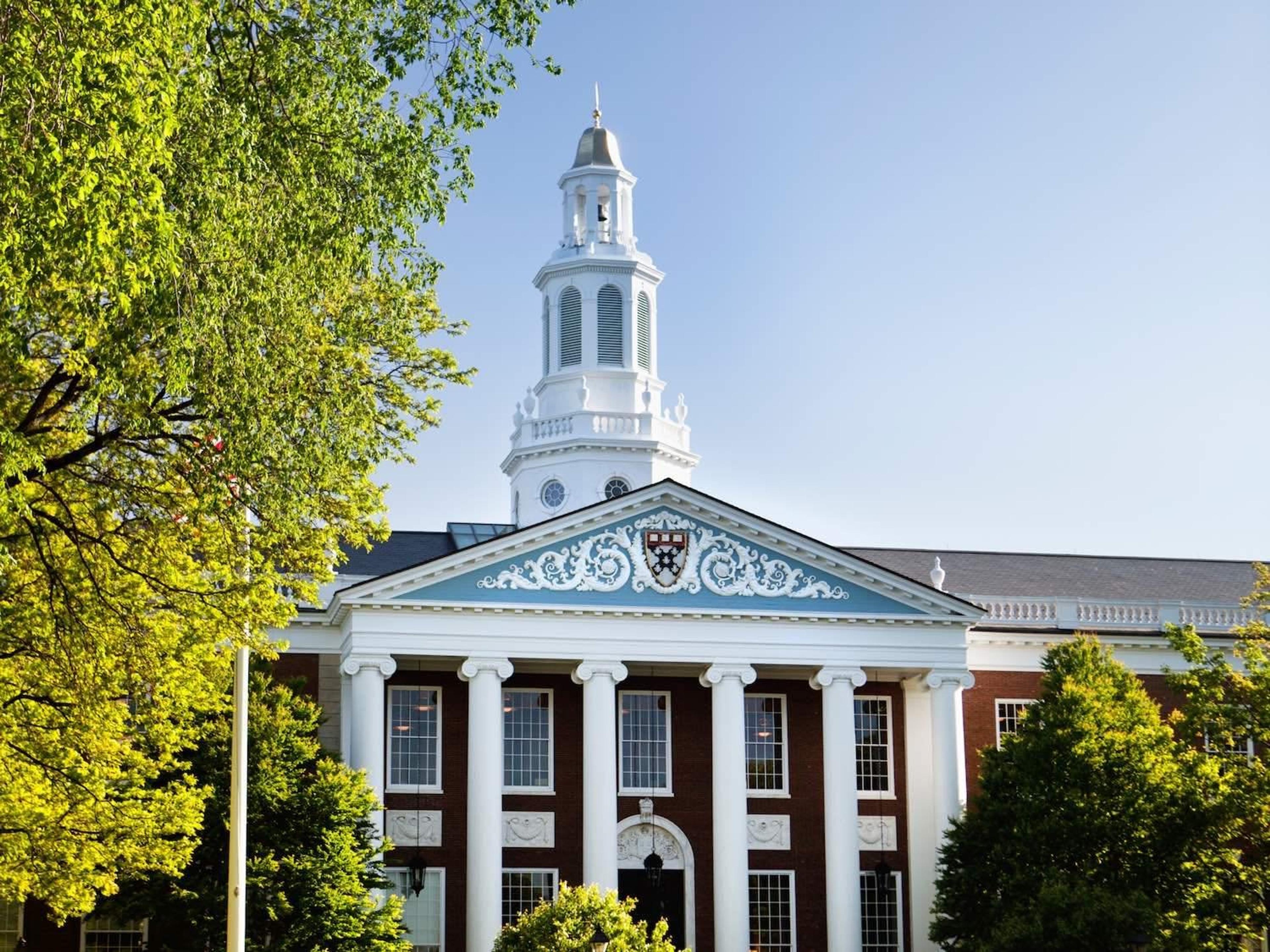
March 12, 2024
An Overview of the HBS 2+2 Program—and How to Kick Off Your Application
HBS 2+2 is one of the most prestigious deferred MBA programs in the country. Here's an overview, with some tips on how to start your application.

How to Get the Perfect MBA Letter of Recommendation—With Examples
The ultimate guide to the MBA recommendation letter, including examples of letters that helped applicants earn admission to top 10 MBA programs.


MBA Essay Too Long? Here's How to Fix It
The word count of most MBA application essays is very limited. This article by an expert Leland MBA coach will give you 8 tips to help you keep your essays under the limit while still maintaining a compelling story.

January 31, 2024
How to Nail the "Why Wharton" MBA Essay
Learn how to craft a compelling 'Why Wharton' MBA essay that sets you apart from the competition. Elevate your application to stand out.

May 4, 2023
Why ChatGPT Can’t Write Your Personal Statement
While ChatGPT is multifaceted, there is a compelling argument against using AI for your personal statements. Here is one expert's take on the revolutionary technology and application essays.

April 12, 2024
Top 10 Deferred MBA Programs in the US—and How to Get In (2024)
Aiming for an MBA, even while you're still in college? Perfect—learn all about deferred admission MBA programs and receive key insights into the DMBA application process.

February 27, 2023
Craft a Powerful Essay for Stanford GSB: What Matters Most & Why?
Ben L., a GSB MBA, expert coach, and pro writer, outlines his top advice for nailing the challenging and broad Stanford essay prompt, to help you get into one of the most prestigious MBA programs in the world.

A Guide to the Columbia Business School Essays (2023-2024)
Coach Melanie E. walks you through each Columbia Business School essay prompt for the 2023-2024 cycle, breaking down what adcoms are looking for and offering expert advice on how to nail your responses.

50 MBA Essays That Got Applicants Admitted To Harvard & Stanford
- Share on Facebook
- Share on Twitter
- Share on LinkedIn
- Share on WhatsApp
- Share on Reddit

What Matters? and What More? is a collection of 50 application essays written by successful MBA candidates to Harvard Business School and Stanford Graduate School of Business
I sat alone one Saturday night in a boardroom in Eastern Oregon, miles from home, my laptop lighting the room. I was painstakingly reviewing a complex spreadsheet of household energy consumption data, cell by cell. ‘Why am I doing this to myself? For remote transmission lines?’…I felt dejected. I’d felt that way before, during my summer at JP Morgan, standing alone in the printing room at 3 a.m., binding decks for a paper mill merger that wouldn’t affect my life in the least.
That’s how an analyst at an MBB firm started his MBA application essay to Stanford Graduate School of Business. His point: In a well-crafted essay, he confronts the challenge of finding meaning in his work and a place where he can make a meaningful difference. That is what really matters most to him, and his answer to Stanford’s iconic MBA application essay helped get him defy the formidable odds of acceptance and gain an admit to the school.
Getting into the prestigious MBA programs at either Stanford Graduate School of Business or Harvard Business School are among the most difficult journeys any young professional can make.
NEARLY 17,000 CANDIDATES APPLIED TO HARVARD & STANFORD LAST YEAR. 1,500 GOT IN
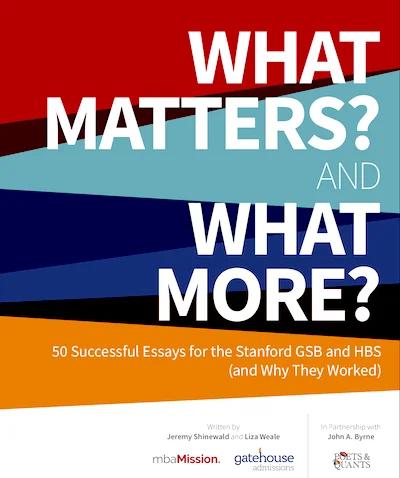
This collection of 50 successful HBS and GSB essays, with smart commentary, can be downloaded for $60
They are two of the most selective schools, routinely rejecting nine or more out of every ten applicants. Last year alone, 16,628 candidates applied to both schools; just 1,520 gained an acceptance, a mere 9.1% admit rate.
Business school admissions are holistic, meaning that while standardized test scores and undergraduate transcripts are a critical part of the admissions process, they aren’t the whole story. In fact, the stories that applicants tell the schools in the form of essays can be a critical component of a successful application.
So what kinds of stories are successful applicants to Harvard and Stanford telling their admission officers? For the first time ever, a newly published collection of 50 of these essays from current MBA students at these two schools has been published. In ten cases, applicants share the essays they wrote in applying to both schools so you can see whether they merely did a cut-and-paste job or approached the task anew. The 188-page book, What Matters? and What More?, gains its title from the two iconic essay prompts at Harvard and Stanford.
THOUGHTFUL CRITIQUES OF THE ESSAYS
Stanford can easily boast having the most difficult question posed to MBA applicants in any given year: In 650 words or less, candidates must tell the school what matters most to them and why. Harvard gives applicants ample room to hang themselves, providing no word limit at all, “What more would you like us to know as we consider your candidacy?”
One makes this unusual collection of essays powerful are the thoughtful critiques by the founders of two MBA admissions consulting firms, Jeremy Shinewald of mbaMission and Liza Weale of Gatehouse Admissions. They write overviews of each essay in the book and then tear apart portions by paragraphs to either underline a point or address a weakness. The book became available to download for $60 a pop.
As I note in a foreword to the collection, published in partnership with Poets&Quants, the essay portion of an application is where a person can give voice to who they are, what they have achieved so far, and what they imagine their future to be. Yet crafting a powerful and introspective essay can be incredibly daunting as you stare at a blank computer screen.
APPLICANTS OPEN UP WITH INTIMATE STORIES THAT SHOW VULNERABILITY
One successful applicant to Harvard Business School begins his essay by conveying a deeply personal story: The time his father was told that he had three months to live, with his only hope being a double lung transplant. had to undergo a lung transplant. His opening line: “Despite all we had been through in recent years, I wasn’t quite sure what to expect when I asked my mother one summer evening in Singapore, ‘What role did I play during those tough times?’”
For this candidate to Stanford Graduate School of Business, the essay provided a chance to creatively engage admission readers about what matters most to him–equality-by cleverly using zip codes as a hook.
60605, 60606, 60607.
These zip codes are just one digit apart, but the difference that digit makes in someone’s life is unfathomable. I realized this on my first day as a high school senior. Leafing through my out-of- date, stained, calculus textbook, I kept picturing the new books that my friend from a neighboring (more affluent) district had. As college acceptances came in, I saw educational inequality’s more lasting effects—my friends from affluent districts that better funded education were headed to prestigious universities, while most of my classmates were only accepted by the local junior college. I was unsettled that this divergence wasn’t the students’ doing, but rather institutionalized by the state’s education system. Since this experience, I realized that the fight for education equality will be won through equal opportunity. Overcoming inequality, to ensure that everyone has a fair shake at success, is what matters most to me.
HOW AN APPLICANT TO BOTH SCHOOLS ALTERED HIS ESSAYS
Yet another candidate, who applied to both Harvard and Stanford, writes about being at but not fully present at his friend’s wedding.
The morning after serving as my friend’s best man, I was waiting for my Uber to the airport and—as usual—scrolling through my phone,” he wrote. “I had taken seemingly hundreds of photos of the event, posting in real time to social media, but had not really looked through them. With growing unease, I noticed people and things that had not registered with me the night before and realized I had been so preoccupied with capturing the occasion on my phone that I had essentially missed the whole thing. I never learned the name of the woman beside me at the reception. I could not recall the wedding cake flavor. I never introduced myself to my friend’s grandfather from Edmonton. I was so mortified that before checking into my flight, I turned my phone off and stuffed it into my carry-on.
The Stanford version of his essay is more compact. In truth, it’s more succinctly written and more satisfying because it is to the point. By stripping away all but the most critical pieces of his narrative, the candidate focuses his essay entirely on his central point: the battle of man versus technology.
Even if you’re not applying to business school, the essays are entertaining and fun to read. Sure, precious few are New Yorker worthy. In fact, many are fairly straightforward tales, simply told. What the successful essays clearly show is that there is no cookie-cutter formula or paint-by-the-numbers approach. Some start bluntly and straightforwardly, without a compelling or even interesting opening. Some meander through different themes. Some betray real personality and passion. Others are frankly boring. If a pattern of any kind could be discerned, it is how genuine the essays read.
The greatest benefit of reading them? For obsessive applicants to two of the very best business schools, they’ll take a lot of pressure off of you because they are quite imperfect.
GET YOUR COPY OF WHAT MATTERS? AND WHAT MORE? NOW
Questions about this article? Email us or leave a comment below.
- Stay Informed. Sign Up! Login Logout Search for:

How To Improve Your MBA Odds If You’re 30+

MBA Rankings: Take Them With A Grain Of Salt

Advice Column: Should I Accept One Of My Current MBA Offers, Or Try Again Next Year?

Six Tips For Getting Into Duke Fuqua’s MBA Program
- How To Use Poets&Quants MBA Admissions Consultant Directory
- How To Select An MBA Admissions Consultant
- MBA Admission Consulting Claims: How Credible?
- Suddenly Cozy: MBA Consultants and B-Schools
- The Cost: $6,850 Result: B-School
Our Partner Sites: Poets&Quants for Execs | Poets&Quants for Undergrads | Tipping the Scales | We See Genius

- Mar 10, 2022
MBA Reapplicant Strategy
Updated: Feb 1
After spending months reflecting on your goals and writing essays that you hoped would be impactful, to be met with rejection is gut-wrenching.
Many applicants give up. And to be fair, who can blame them?
But many come back to the table and put themselves through it all over again. What’s important to know is that you cannot simply re-use the same content the second time around. If it didn’t work before, why would it work now?
In this article, I discuss what you should change as an MBA reapplicant and what (if anything) to keep the same.

How do business schools perceive reapplicants?
Business schools claim to assess reapplicant candidates without bias. They say that they “objectively re-evaluate your application to understand the alignment with the school and its community”, just like any other applicant.
That being said, reapplicants do tend to have a lower admittance rate than first-time applicants. One reason is that many tend to think that MBA applications are a matter of chance, like a lottery where all tickets are equal. So they don't change much about their application.
In fact, as a reapplicant, you're in a new situation entirely. You should embrace the fact that your first application was not what the school is looking for, and think about how you can thoroughly overhaul it.
How do I evaluate a rejection? What can I do differently as an MBA reapplicant?
As a reapplicant, you’ll generally be asked the same questions as every other applicant. These may have changed from the year you last applied, but even if they have not, you should re-write your essays from scratch anyway.
This is because your application won’t be read as ‘fresh’; schools will open up your application file from last year and contrast it with your new application to see how your narrative has evolved. Be careful though! Your stories can change, but you should avoid directly contradicting any claims from your earlier application. For example, changing your timeline.
Aside from the usual essays, most business schools ask that you add a Reapplicant Essay. This essay lets you demonstrate how you reacted to last year’s rejection, and how you’ve grown as an applicant since then. We'll talk more about this later.
On the positive side, applying to a school again the following year shows a clear commitment to the school, which admissions committees appreciate. If you've genuinely spent time re-evaluating your application and improving it, then, it will work in your favour. So, reflect on each component of your application and identify every area of potential improvement:
1. School selection
Finding the ‘fit’ between you and your target school is crucial to the MBA application process. Go over the school's class profiles for the last couple of years to identify your demographic in the class, looking for details that you might have missed last year.
For example, suppose you're an over-represented white American male with an IB background applying to Columbia. In this case, you'll probably need to have a compelling narrative and a GMAT score that's 10-20 points above the class average. If you overlooked this before, now’s the time for a reality check.
So, take a cold look at the competitiveness of the schools you're targeting. Form a new list of target schools with a balance of reach and safe schools.
Ask yourself a few tough questions:
Did you apply to schools without realizing the fit? In that case, you should spend some more time identifying schools with a better fit. Speak to current students and alumni.
Did you apply to schools that were way out of reach? If yes, then target a new set of ~6 schools, striking a balance between reach, middle and safety schools. Consider getting an honest profile review from an admissions consultant to understand which schools are realistic for your profile.
2. Letters of Recommendation
LORs provide the Adcom with a third-person impression of you and, crucially, they provide reassurance that you’re happy to receive constructive feedback during your program. They allow the Adcom to assess your strengths and leadership. They validate your leadership capabilities.
As a reapplicant, it’s especially important that you manage your recommender. Check out this blog describing what the recommender should say and how you can manage them .
When choosing a recommender, think about these red flags. All these scenarios could be a factor contributing to your rejection:
Recommendations from people who've not managed you directly
Recommendations from people who've never given you feedback
Choosing recommenders who are not willing to write that you’re in the top 5% of performers.
Choosing recommenders who cannot directly speak about your abilities because they're too senior to you and haven't shared a closer proximity to understand you better
Or someone who would've rushed through the recommendation and did not invest time to highlight the right side of you.

3. Academics
Business school admissions committees take the view that “past performance is indicative of your future potential”. Therefore, your undergrad GPA will help them understand your academic potential and preparedness for the rigorous MBA curriculum.
These are the average GPAs for some of the top schools:
Harvard Business School (Class of 2023) - 3.69
Columbia Graduate School of Business (Class Entering in 2021 Jan & Aug) - 3.5
Kellogg School of Management (Class of 2023) - 3.7
Ideally, your GPA is above or in line with the class average. If not, in your optional essay you may want to add a clear explanation of why it was low and how you've compensated for it. Also, add what you've learnt from that academic experience, and reassure that you’ll be engaged and successful during your academic MBA classes.
4. Post-MBA goals
Part of your rejection might have been because the school didn’t like your post-MBA goals. Bear the following points in mind while writing about your post-MBA goals:
Be clear and concise: Nothing beats a clearly-articulated career goals essay that precisely outlines your professional purpose, short-term goals, and long-term goals.
Analyze the recruitment fit: As a reapplicant, it’s even more important that you’ve assessed the fit with the school in terms of recruitment. Is the school likely to be successful in placing you into your target role? Particularly if your post-MBA goals are very specific, or don’t really fit with the school's recruitment patterns, it’ll add uncertainty to your profile. Spend some time understanding your post-MBA goals and how the school fits into these goals, such as by assessing their employment report. If you still think there’s a fit with this school, clearly explain your plan this year in your essays.
Here's an example of a well-articulated post-MBA goal:
"Post-MBA, I intend to work at a top-tier management consulting firm such as Bain, McKinsey, BCG or Deloitte in a financial service consulting role. For this, I've begun building my network of financial service consulting recruiters and have lined up a few internship opportunities to pursue during my MBA. In the long run, I plan to take my client-facing and financial modelling skills and transition into a strategy role in the financial services industry."
Well-crafted essays bear the heart and soul of the applicant. They allow the Adcom to uncover who you are. The schools don't dictate particularly strict formal written communication, and usually offer the space for you to indulge in storytelling.
It's the space for you to demonstrate skills such as leadership, self-reflection, self-awareness, team spirit, creativity, tenacity, strategic thinking and communication. So, you can't rush the process. Give it time and develop your ideas through multiple iterations.
Start by chalking out the theme of the essay. Next, create an overall structure. A good rule of thumb is to aim for 50% stories and 50% analysis. Finally, edit until you know you're ready to hit submit .
Do not recycle the essay material from the last year or your applications to other schools and expect a different result. Instead, view this as an opportunity to refocus and demonstrate the wisdom and fresh perspective you've acquired since the last time you applied.
Be sure to touch on the fit with the school, perhaps in terms of cultural, personal, professional, geographical, and academic factors.
Also, show how engaged you have been in pursuing your MBA at their school. Again, mentioning your conversations with current students and alumni will help here. Discuss your academic and professional plans and how you will engage within the school and alumni community.
If the school has a reapplicant essay , make sure you discuss how you reacted to the rejection and rebuilt your application. Specifically, add the new experience you’ve gained and the change in your circumstance since your last application. This will demonstrate self-analysis and awareness and reveal how you rebuild yourself when faced with a failure.
If there's no reapplicant essay, then use the additional information space to discuss any updates to your circumstances.
Lastly, don't leave the additional information question blank in hopes that the adcom will overlook your weaknesses or gaps in your resume. As a general rule, you should assume that they will assume the worst. So, if you haven't already, make sure you explain any gaps.
Third-person perspective
Tried seeking feedback from schools? Received vague responses? Showed your application to your colleagues or friends and family with no actionable feedback? Self-analyzed for hours but unsure what strategy to apply?
I was an MBA applicant once, and my MBA application process was horrific. I was overwhelmed by the process, lacked confidence, and over-analyzed my application until my writing lost flair. Now, my aim is to help determined applicants get admitted to top MBA programs. So, if you're unsure exactly how to do this and want to boost your chances of getting in this year, book a free 30 mins chat with me right away.
- How to apply for an MBA
Recent Posts
MBA Programs Offering GMAT/GRE Waivers in 2024
Help! I Don't Have a Typical MBA Career
How to Write a MBA Scholarship Essay 2024
_JPG.jpg)
Hi, I'm Sam. I'm the founder of Sam Weeks Consulting. Our clients get admitted to top MBA and EMBA programs.
Ranked #2 MBA Admissions Consultant of 2022
- May 12, 2022

Success Stories: How I got a $170,000 scholarship to NYU Stern MBA
- Apr 21, 2022

Why Does a Lawyer Need an MBA?

Oxford Saïd MBA Recommendation Questions 2023 - 2024

Duke Fuqua MBA Recommendation Questions 2023 - 2024

Recent Video
Mba essay guides.
.png)
Client Testimonials
Connect with us.

Which program are you applying to?

Accepted Admissions Blog
Everything you need to know to get Accepted

April 12, 2018
How to Reapply Successfully to Top MBA Programs [Video]
You didn’t get accepted. It happens. And it’s NOT the end of the world. It’s time to examine your mistakes, learn what went wrong, and figure out how you can improve your application so that the next time you apply, it’s the LAST time you apply. You WILL get into your dream MBA program!
Watch this video to learn how you can reapply successfully to top MBA programs.
You’re right. Rejection is disheartening , demoralizing, and maybe even a tad embarrassing. After all, you worked hard and told a lot of people you were applying to MBA programs. And now you’re not going. At least not yet.
I’d like to help you change that “not yet” into a successful MBA reapplication.
How do I know how to reapply? I am the president and founder of Accepted, the premier admissions consultancy. We here at Accepted have helped MBA applicants reapply successfully for over 20 years.
If you’ve recently been rejected by a top MBA program, then you need a different approach – one that will lead to different results. Here’s why: Clearly your previous application didn’t work. If you don’t change the inputs, you won’t change the results. And you certainly don’t want to go through rejection again.
Here is feedback from one MBA reapplicant who worked with Accepted consultant, Natalie Grinblatt Epstein ; it provides more evidence of Accepted’s reapplication value:
“From the start, Natalie was honest and really got to know who I was. As part of helping me craft an application that highlighted my attributes, we redesigned the layout of my resume and optimized my essay topics to present me in the most well-rounded way…The results speak for themselves as I will be attending MIT Sloan.”
You know what happened with your last app. Imagine a different outcome. A successful application leads to you receiving a large welcome packet from your top choice school, The excitement of starting the new program, entering a new network, and launching the next (and higher-paid) stage of your career.
I’d like to give you 3 steps to a successful reapplication effort so that the visions you now see in your mind’s eye become reality.
Step #1: Evaluate what went wrong
1. You weren’t competitive at your target programs.
2. You failed to present your qualifications effectively.
3. You were a victim of the numbers and intense competition at programs that reject 70%, 80%, 90% or more of applicants.
4. A combination of all 3.
Step #2: Fix what went wrong
1. Either improve your competitiveness or apply to programs where you are competitive.
2. Present yourself effectively. Use specifics, anecdotes, and examples to support your main points, add distinctiveness to your application, and engage your readers. Eliminate sloppiness. Show that you both belong at your target school and that you stand out in the applicant pool.
3. Don’t assume that everything else was stellar and it was just the numbers. The numbers are rarely the sole reason for rejection.
4. A combination commonly causes rejection in which case you need to address all elements that contributed to the ding.
Step #3: Reapply successfully
I’ve given you the foundation of a successful reapplication, but how to build upon it, that’s tough to do on your own. It’s extraordinarily difficult to objectively evaluate the application that you worked so hard on. Most MBA applicants will try to do it on their own. And they lack the objectivity and MBA admissions experience to assess effectively what went wrong and make solid recommendations for improvement. Don’t make the same mistake. Don’t let rejection happen to you again.
You’re now at a decision point: You can continue down the path you’re on, which will most probably lead to another ding, pushing off your current professional trajectory and earnings.
Or you can choose a different path that leads to a fantastic MBA experience, a great career, and higher earnings. But first you have to figure out what went wrong last time and how to go down the path to acceptance.
That’s what Accepted’s Rejection Review will give you. All of our consultants have served on admissions committees and/or worked for years as admissions consultants. They can provide the experience and objectivity you lack while saving you time.
If the only thing you get out of Rejection Review is insight into what went wrong, it would be worth it.
If the only thing you got from Rejection Review is direction going forward so that you can change the results next time around, it would be worth many multiples of what we charge.
If the only thing you save by purchasing a Rejection Review is time because you don’t have hours to spend on another DIY application effort, it’s worth it.
But Rejection Review doesn’t give you one of these elements; it gives you all of them.
You and your professional future deserve professional assistance. To get that professional assistance and experienced objectivity, here’s what I’d like you to do:
1. Go to www.accepted.com/MBAReview . 2. Purchase our Rejection Review Service. 3. Make the changes that will lead to acceptance.
Leave the sting and disappointment of rejection in the past. Move from confusion to insight. From frustration to confidence. From humiliation to pride. From rejection to “Yes! I’m IN” at the top MBA programs that open the doors to your dream career.
Check out our Rejection Review Service for more information.

Related Resources:
• Applying to B-School with Low Stats: What You Need to Know , a free guide • You Can Do It: Reject Rejection! • Should I Reapply to B-School? And to Which Programs?
About Us Press Room Contact Us Podcast Accepted Blog Privacy Policy Website Terms of Use Disclaimer Client Terms of Service
Accepted 1171 S. Robertson Blvd. #140 Los Angeles CA 90035 +1 (310) 815-9553 © 2022 Accepted

Would you like a Free Profile Evaluation?

Strategies For Creating MBA Essay For Reapplicants
Table of content.
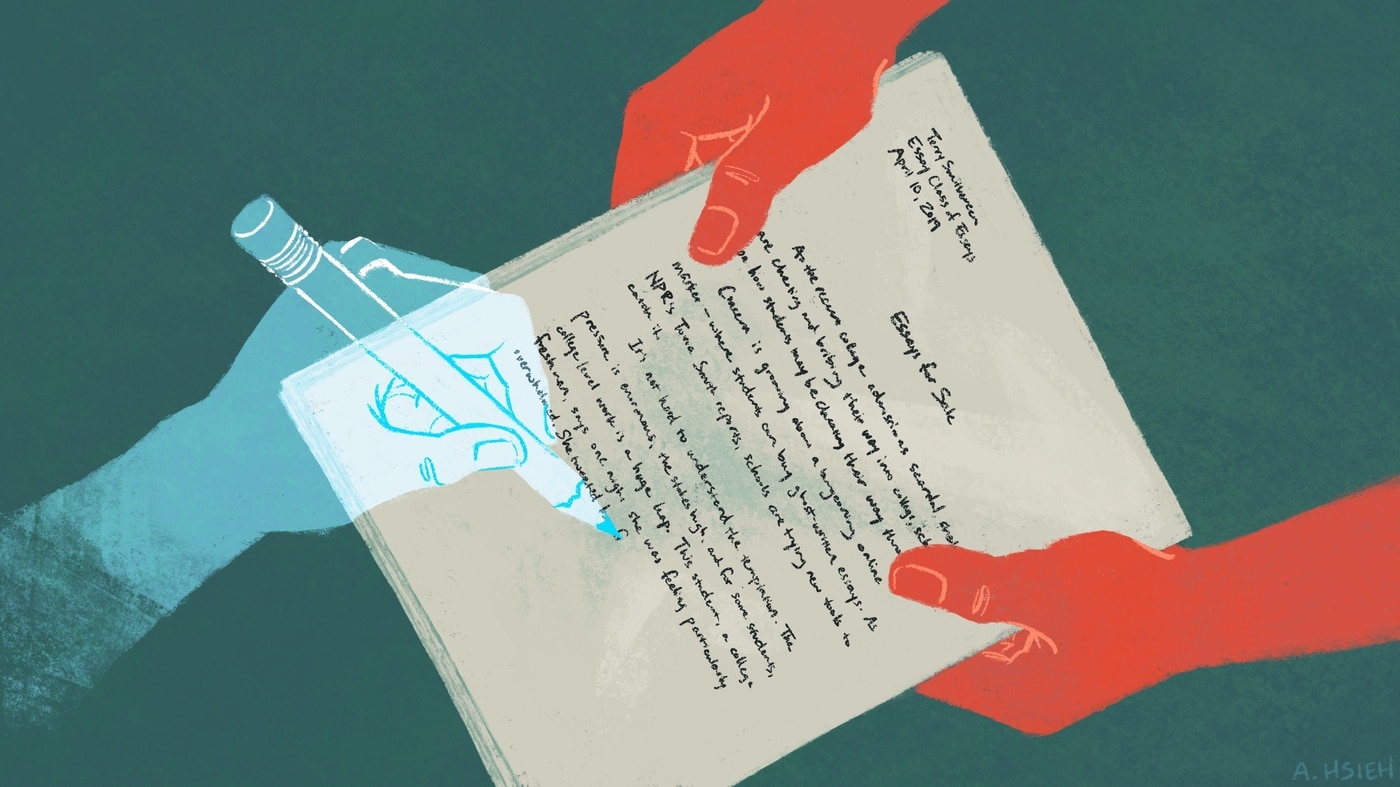
Applying for a graduate program or a job opportunity can be a challenging process, and if you have been through it before as a reapplicant, it can be even more daunting. However, being a reapplicant doesn’t mean the end of the road for your dreams. In fact, it presents an opportunity for growth and improvement. One crucial aspect of the reapplication process is the reapplicant essay, where you have the chance to address your previous application’s weaknesses and demonstrate your growth and determination. In this blog post, we will discuss effective tips and tricks to help you tackle the reapplicant essay with confidence and increase your chances of success.

Reflect on Your Previous Application:
Before you begin writing your reapplicant essay, take some time to reflect on your previous application. Identify the weaknesses, gaps, or areas that could be improved. Was it the lack of experience, inadequate preparation, or a poorly crafted essay? Understanding what went wrong will help you focus on those specific aspects in your reapplicant essay and showcase your growth.
Highlight Your Progress and Achievements:
The reapplicant essay provides an excellent opportunity to showcase your progress since your last application. Highlight any new experiences, achievements, or skills you have acquired during this time. Discuss projects, internships, coursework, or any other relevant activities that demonstrate your commitment to personal and professional growth. This will show the admissions committee or employer that you have used your time wisely and have actively worked on improving yourself.
Address Weaknesses Head-On:
Don’t shy away from addressing the weaknesses or gaps in your previous application. Instead, acknowledge them and provide a clear explanation of what you have done to overcome those challenges. Did you take additional courses, attend workshops, or seek mentorship to enhance your skills? Be specific and provide concrete examples to demonstrate your proactive approach to self-improvement.
Show a Deeper Understanding of the Institution or Company:
One area where reapplicants often have an advantage is their familiarity with the institution or company they are applying to. Use this to your advantage by showcasing a deeper understanding of their values, mission, and culture. Explain how your experiences and goals align with what they offer. This will demonstrate your commitment and enthusiasm, and it will also show that you have done your research and are genuinely interested in being part of their community.
Seek Feedback and Professional Help:
To gain a fresh perspective and improve your reapplicant essay, seek feedback from trusted mentors, advisors, or professionals in the field. They can provide valuable insights and suggestions to strengthen your essay. Consider working with a professional editor or consultant who specializes in application essays. Their expertise can help you refine your writing, enhance the clarity of your message, and ensure that your essay stands out.
Revise and Tailor Your Essay:
Avoid submitting the same essay you used in your previous application. Take the time to revise and tailor your essay to reflect your growth and respond directly to the weaknesses you identified. Start from scratch if necessary, and ensure that your essay is well-structured, coherent, and engaging. Make every word count by showcasing your unique qualities, experiences, and aspirations.
Show Resilience and Determination:
One of the key qualities admissions committees and employers look for in reapplicants is resilience. Showcasing your determination to succeed despite previous setbacks is vital. Discuss how you have learned from your previous experience and how it has motivated you to become an even stronger candidate. Admissions committees and employers appreciate individuals who can learn from their mistakes and come back stronger.
Use the Reapplicant Essay to Add Value:
Think of your reapplicant essay as an opportunity to add value to your application. Go beyond addressing your weaknesses and provide additional insights, experiences, or perspectives that were not included in your previous application. Consider discussing any relevant community involvement, leadership roles, or unique perspectives you can bring to the institution or company. By adding value, you demonstrate your potential to contribute to their community and make a meaningful impact.
Seek a Fresh Perspective:
As a reapplicant, it’s essential to approach your essay with a fresh perspective. Avoid dwelling solely on the past and instead focus on your present and future goals. Show how you have grown, evolved, and gained a new perspective since your last application. This will give the admissions committee or employer confidence that you have learned from your previous experience and are ready to embark on a new chapter with renewed enthusiasm.
Pay Attention to Details:
While the content and message of your reapplicant essay are crucial, paying attention to the finer details is equally important. Ensure that your essay is free from grammatical errors, typos, and inconsistencies. Present your ideas in a clear and organized manner. Take the time to proofread and edit your essay thoroughly, or ask someone else to review it for you. A polished essay reflects your attention to detail and professionalism.
Stay Positive and Confident:
Maintaining a positive and confident tone throughout your reapplicant essay is essential. Avoid sounding defensive or dwelling too much on your previous rejection. Instead, focus on the lessons you have learned and the growth you have achieved. Demonstrate your enthusiasm for the opportunity to reapply and your confidence in your ability to succeed this time around. A positive mindset can make a significant difference in how your essay is perceived.
Submit Early:
Don’t wait until the last minute to submit your reapplicant essay. Aim to complete it well ahead of the deadline, allowing time for revisions and feedback. By submitting early, you demonstrate your commitment and eagerness to secure a spot in the program or job opportunity. It also shows that you are organized and proactive, qualities that are highly valued by admissions committees and employers.
Also read: https: IE Business School MIF Program : Complete Overview
Conclusion:
Tackling the reapplicant essay can be a challenging task, but with the right approach and mindset, it can become an opportunity for growth and improvement. By reflecting on your previous application, addressing weaknesses, showcasing progress, and tailoring your essay, you can present a compelling case for your candidacy. Remember to seek feedback, revise diligently, and stay positive throughout the process. With determination, resilience, and a well-crafted reapplicant essay, you can increase your chances of success and achieve your goals. Embrace the opportunity to demonstrate your growth and potential, and trust in your ability to make a strong impression with your reapplication.
Wondering if you can target this school?
Free Profile Evaluation Workshop
Join our live workshop and
Get all your profile related questions answered.

More Blog To Read

Top Master in Management Colleges of 2024

Be confident for Your MBA interview

Tips for Excelling in MBA Group Interviews

Profile Evaluation Workshop
Want to get your profile evaluated?

- MBA>Application Tips
The Re-Applicant Essay
September 28, 2010 :: Admissionado Team
Usually goes something like: How have you strengthened your candidacy since you last applied? Please reflect on how you have grown personally and professionally.
Who here has seen the movie Iron Man?
Well for those of you who haven’t seen it, (1) see it, it’s pretty tight and (2) here’s a bit of background before I make my patented absurd (but well-intended) analogy. Tony Stark is a pre-eminent industrialist, with an unusual brain for science and mechanics. He makes his fortune as CEO of a company that manufactures and distributes military weapons. Caught in the cross-fire of an unanticipated ambush, Stark’s body (and heart) is riddled with shrapnel. A hare’s breath away from death, a device connected to his heart (powered by an external battery) keeps him alive, barely. Trapped in a cave and held hostage by terrorists, he’s forced to build them a weapon of mass destruction. Instead, he (a prodigious inventor/savant) builds himself a suit made out of iron… and escapes from the clutches of the extremists. The suit that he builds under duress, is JUST GOOD ENOUGH to enable his escape, but is worthless afterwards. It was clunky, bulky, inefficient… but barely worked. Time passes, and safe at home now, Stark sets his mind to building a NEW SUIT. This time, now that he knows what he is capable of, he does everything perfectly. And the suit is lean, efficient, has new capabilities: it’s an absolute thing of perfection.
Phew. Now, for all you re-applicants, here’s what happened. The first time around, you guys built a suit that was juuuuuust good enough to get yourselves out of that cave. But it was clunky. Bulky. Inefficient. Lacking somehow… but…. someone read through it. It worked, but not well enough. Here we are, one year later. Two years later. Whatever it is. And you have….
Figured. It. Out.
You are going to build a suit that looks and feels so different, it is almost unrecognizable. You’ve tinkered with the joints. You’ve understood how to make the breathing apparatus more comfortable. You’ve realized that aerodynamics are a function of XXX and not YYY. You’ve changed just about everything.
The key is demonstrating not just THAT you’ve changed (of course people are going to look different a year from now—that’s just nature), but rather… how SIGNIFICANTLY you’ve changed. This is the thing to capture. What is it you’ve learned since last time? And why should we care? What have you done toward addressing that?
Okay okay… how do you actually DO IT???
Look back on the application you submitted the first time around. Look at the person THEY saw.
SEE IT THROUGH THEIR EYES.
If you’re doing this correctly, you should be nodding a knowing nod, saying “Hm. They made the absolute correct decision. Look at this kid. He didn’t have XX. He was weak in YY. He just didn’t have clarity in ZZ. Wow, they were WISE to have dinged the crap out this kid.” It may hurt to see yourself in this light, but this is crucial. This exercise will unlock the best possible version of your essay imaginable. Because now you have a frame of reference, against which you can compare “the new you.” The biggest mistake you can make is to say, well you fools didn’t see it a year ago, and this time I’m gonna yell a little louder and push harder to MAKE you see it.
No. They saw it just right. At least, that’s the way you need to approach it.
Acknowledge it even. Talk honestly about how, wow, one year ago I was confused about XX and it manifested itself THIS way. One year later, on account of this incredibly full and productive year or two, I now see it THIS way. Be earnest, admit to the fact that you have improved. But to do that, become comfortable with the idea that you weren’t quite there on that first application. Admit to yourself that that original suit was a great idea…. but a failure of execution. And you’re able to see that now, with some perspective. Build yourself a new suit by acknowledging what was wrong with the first one.
Related articles

get started.
Full Transparency
We might not be your best fit. If that’s the case, we will let you know.

Customized for You
Track Your Progress
Practice Pays
Practice thousands of GMAT questions with top expert solutions.
Identify and improve upon mistakes efficiently using our Error Log.
Get the latest tips and news from our top GMAT professionals.
- it’s free and easy!
Thank you for using the timer! We noticed you are actually not timing your practice. Click the START button first next time you use the timer. There are many benefits to timing your practice , including:
We’ll give you an estimate of your score
We’ll provide personalized question recommendations
Your score will improve and your results will be more realistic

Begin your MBA admissions journey with a free 1-1 strategy call
FREE Prospects Evaluation!
Top MBA Application Tips Guide
How to Finance Your MBA with Little to No Savings?
Tuck School of Business at Dartmouth Summer Visit Days
Kickstart Your MBA Journey With a Free 1:1 Consultation
Applicants: Do's and Don'ts in Selecting your Recommenders

03:00 PM IST
04:00 PM IST

07:00 PM PDT
08:00 PM PDT

02:00 PM EDT
03:00 PM EDT

03:00 PM PDT
04:00 PM PDT

08:00 AM EDT
09:00 AM EDT

10:00 AM PDT
12:00 PM PDT

10:00 AM EDT
10:30 AM EDT
Tackling the MBA Application Reapplicant Essay
- GMAT Prep Courses
- MBA Programs
- Build Your Study Plan
- Best GMAT Books
- All the GMAT Tests
- GMAT Focus Tests
- GMAT Verbal
- Error Log Templates
- GMAT Official Guide
- Manhattan Prep
- Target Test Prep
- Experts' Global
- Full Time MBA Rankings
- Part Time MBA Rankings
- Executive MBA Rankings
- International MBA Rankings
- Best App Tips
- Best MBA Books
- Application Reference
- Free Profile Evaluation
Copyright © 2024 GMAT Club
GMAT ® is a registered trademark of the Graduate Management Admission Council ® (GMAC ®). GMAT Club's website has not been reviewed or endorsed by GMAC.
The post is bookmarked successfully
Tips for Your Columbia Business School Application Essays
May 30, 2023
Kelly Lundy
Columbia Business School (CBS) has chosen to revisit its application essays this year, replacing last year’s third prompt “Tell us about your favorite book, movie, or song and why it resonates with you.” In its place, the school brought back a question from the previous year’s application, which is meant to highlight an applicant’s ability to be an ethical and inclusive leader.
To write successful essays for CBS, you will need to convey that you have clear goals, especially well-thought-out reasons for wanting to attend the school and live in New York City (NYC), and strong values. Moreover, you should do your homework on CBS so you can really prove that it is the best place for you. CBS doesn’t want to be a commuter school filled with people coming to Manhattan for a two-year vacation; it wants to know that you recognize and appreciate it for the world-class business school it is and that you plan to be a leader in its community. So, demonstrating “fit” is critical. Let’s delve deeper into each CBS application essay question.
Applicants must complete one short-answer question and three essays.
Free : Download Stratus Admissions’ Guide to Getting into Columbia Business School
SHORT ANSWER QUESTION:
What is your immediate post-mba professional goal (50 characters).
This is a noticeably short statement (remember—50 characters , not words!). Make your response as specific as possible, noting the position you want, the industry that interests you, and/or a company that is ideal for you. Keep in mind that whatever you say here should tie into your first long required essay.
Essay One: Through your resume and recommendation, we have a clear sense of your professional path to date. What are your career goals over the next three to five years and what is your long-term dream job? (500 words)
By starting with some simple context/backstory, you can give the admissions reader a sense of why your stated goals are credible and exciting. Simply launching into why you want to go into consulting or edtech or whatever your interest is could be confusing if you have not yet provided some sense of why you have that interest. So, your first task is to establish that your goals are feasible without rehashing the entirety of your professional path.
Next, delve into your long-term goal. By starting with your long-term goal, you are solidifying why you absolutely need a CBS MBA. Think big, think creatively, and think outside the box. Here, giving a job title is not essential (though you can), but you do need to convey what sort of impact you hope to make—to a community, to a company or organization, or somewhere else. In addition, give examples of how and why your long-term goal will be important.
Finally, describe your three- to five-year career goals, which should directly help you achieve your stated longer-term goals. Consider offering a specific job title and an example of a company or organization you aspire to work for. This will help the admissions committee connect with your goal. You have ample word count here to show that you really know what this job entails—that you are not just chasing prestige but have really thought about fit and about how, after you have completed the CBS MBA program, your desired role will prepare you for your long-term dream job. Be sure that your long-term goal can be achieved via your short-term goal. If you cannot build the bridge from one to the other, the admissions committee will question whether CBS can support you in such an improbable endeavor.
You can briefly finish with how the CBS MBA specifically will be critical in meeting your goals. Consider highlighting certain classes, centers, programs, and/or organizations that are unique to CBS that would be beneficial to you.
Essay Two: The Phillips Pathway for Inclusive Leadership (PPIL) Pathway is a co-curricular program designed to provide students with the skills and strategies needed to develop as inclusive leaders. Through various resources and programming, the goal is for students to explore and reflect during their educational journey on the following five inclusive leadership skills: Mitigating Bias and Prejudice; Managing Intercultural Dialogue; Addressing Systemic Inequity; Understanding Identity and Perspective Taking; and Creating an Inclusive Environment.
Describe a time or situation when you had the need to utilize one or more of these five skills, and tell us the actions you took and the outcome. (250 words).
This essay is a great opportunity to give the admissions committee more depth and perspective on your unique background and experiences. But to begin crafting an effective response to this essay, you first need to learn more about the PPIL program, so be sure to start there.
Because this is a short essay, every word counts. Our suggestion would be to devote approximately 50–75 words to describing the situation you experienced and why it stands out for you. With such tight constraints, you clearly need to get to the heart of the matter quickly. Of course, the situation you choose to discuss is important, but what is more important is revealing your values by sharing the steps you took. You might dedicate 100–125 words to relaying those actions and then use the remainder to discuss the outcome. Remember, your results don’t all have to be rosy. For example, if one takes on systemic racism, it almost goes without saying that the experience will not be an easy one. Even amid such restrictive limits, strive to convey the reality of applying one or more of the stated skills, and make sure your values are on display in a thoughtful manner.
Essay Three: We believe Columbia Business School is a special place. CBS proudly fosters a collaborative learning environment through curricular experiences like our clusters and learning teams , an extremely active co-curricular and student life environment, and career mentorship opportunities like our Executives-in-Residence program .
Why do you feel columbia business school is a good fit for you academically, culturally, and professionally please be specific. (250 words), your answer to this essay should convey that the cbs mba is the best business program for you. before you begin writing, do significant research into what cbs has to offer that fits with your specific goals, including classes and professors (to check the “academic” box), extracurricular clubs and unique traditions (to check the “culture” box), and local networking and internship opportunities (to check the “professional” box). the reasons you give for why you want to attend cbs should be tied to unique aspects of the school and particular interests and needs that you have. for example, you could express your desire to get involved at the lang center for entrepreneurship, to enroll in the healthcare and pharmaceutical management program, to find volunteer opportunities in the local community through the small business development center, or to spend significant time in nyc because of the unparalleled business resources that are within arm’s reach. just as important, remember to tie the resources you highlight to what you need to gain to attain your goals, and address how you will collaborate with classmates and offer them your experiences and time while in the program. .
Research could take the form of reading the CBS website, speaking with students and alumni from similar backgrounds or in relevant post-grad roles, attending an info session, or visiting campus. The application specifically asks candidates to list the students and alumni they have connected with, so leverage such resources as the Hermes Society website to connect with students who have shared interests, backgrounds, or goals. Be aware that if you live in NYC, it is imperative that you schedule a campus visit. Not making an effort to go to campus and engage directly with students there can be a red flag.
Optional Essay:
If you wish to provide further information or additional context around your application to the admissions committee, please upload a brief explanation of any areas of concern in your academic record or personal history. this does not need to be a formal essay. you may submit bullet points. (maximum 500 words).
See our blog post on Optional Essay Do’s and Don’ts for guidance.
Reapplicant Essay:
How have you enhanced your candidacy since your previous application please detail your progress since you last applied and reiterate how you plan to achieve your immediate and long term post-mba professional goals. (maximum 500 words)..
This is an opportunity to explain how you have grown since you last applied. Ideally, you have improved on some aspect(s) of your profile, whether via a higher test score, more work experience or leadership, a promotion, or a similar advancement. Be sure to explain what it is about the school that motivates you to apply again. This can be a great way to show your specific and sincere reasons for valuing a CBS MBA and why you would be a great fit with the program.
In Stratus Admissions’ Guide to Getting into Columbia Business School , you will find information on a variety of the MBA program’s offerings, such as the Lang Entrepreneurship Center, J-Term, Immersion Seminars, and the CBS World Tour. Download our brand-new guide to learn more about CBS!
MBA School Specific
2023-2024 essay Columbia Business School MBA Application Essays Optional Essay Reapplicant short answers
Start Today with a FREE Consultation
Learn how Stratus’ team approach gets you into one of your top choice schools. Start with a FREE consultation with an Admissions Specialist.
Free Consultation
Previous Entry Five Tips to Build Your Quantitative Profile
Next Entry MBA vs MFE: How to Decide
Search Our Blog Articles

MBA Resources
MBA Reapplication Strategy after getting dinged from top B-schools

MBA & Beyond Team
16/12/2023 | 9:45 pm
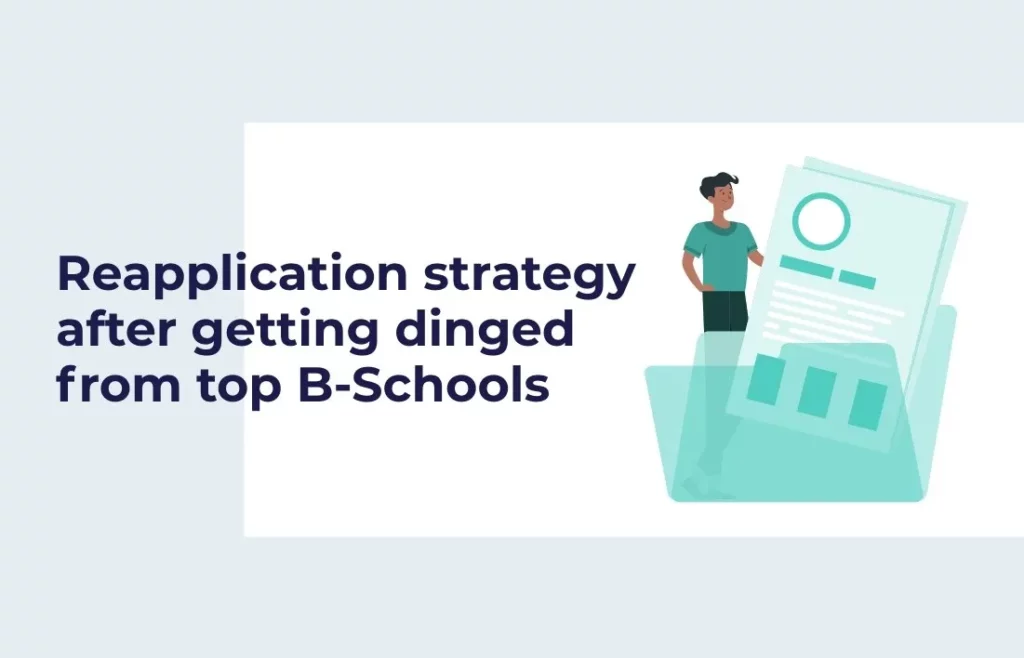
MBA reapplication can be a challenging journey, especially after facing rejection. However, it is important to approach it with resilience and a willingness to learn from past experiences.
Being rejected from a business school does not define your abilities; instead, it presents an opportunity for reflection and growth. By carefully reviewing the feedback provided, identifying areas for improvement, and crafting a stronger application, you can increase your chances of gaining admission to your desired program.
Remember, setbacks are a natural part of this process, and with determination and strategic planning, you can transform them into stepping stones towards achieving your MBA aspirations.
Reapplicants now face a more perplexing dilemma; they don’t know why they were rejected or how to improve their application for success.
This article serves as a comprehensive guide for MBA reapplication, encompassing all the crucial factors to consider before reapplying. We’re here to help you understand why your application might have been turned down and to give you top tips for a better next try.
What could be the reasons for getting “dinged” in your application?
Having great grades while volunteering and juggling a full extracurricular schedule may help, but it won’t guarantee you a slot at one of these elite business schools. Some applicants mistakenly believe that fulfilling all the criteria for a strong profile guarantees acceptance into M7/T10 B-Schools. If only it were the case!
A strong application requires you to pick all the pieces of your profile together and strategically. Your application can be rejected due to several unimaginable factors.
What are the primary reasons for “dinging” an applicant?
The applicant did not invest proper time in the application ( Applicants rushed through the application in a few days and failed to bring out impactful stories in the application)
Did not brainstorm well enough on answering the reason for ‘ Why MBA ’?
Failed to bring out collinearity between the goals .
Did not bring out the right leadership examples.
Failed to highlight the strengths properly.
Generic post-MBA goals (People tend to choose very generic post-MBA goals like Management consultant or Product Management which can be their simple goals. But suppose you are coming from an over-represented background where applicants’ profiles are very similar. In that case, you will need to establish strong collinearity in your goals or craft a narrative of goals that can help you stand out ).
The Applicants did not highlight unique aspects of their personalities. (which is very common in applicants getting dinged. That is why we have a Pre-Application phase with applicants . We help them introspect deep into their lives to bring out a 100% unique and impactful personality in the applications)
Should You Reapply for an MBA Reapplication?
There are many examples of MBA reapplicants who have had great success in their second application round. While some experts suggest that MBA schools favor repeat candidates, the reality is quite different.
In MBA reapplication success, efforts to improve their application and candidacy mostly drive it, such as:
Retaking the GMAT and improving their score.
Getting a job promotion and highlighting career progression.
Enhancing their post-MBA employment prospects.
They are spending more time networking with MBA programs that interest them.
Deciding on a reapplication hinges on your aims and preferred institutions.
If you’re set on a top-tier, two-year MBA, pursuing reapplication becomes your path forward.
It’s a matter of devising the right strategy and fully committing to the process once again. However, if you believe that taking a break from applications to concentrate on strengthening your profile is a more prudent move, then MBA reapplication may not be the most suitable option at this time.
Offering- Have an extensive ding-analysis with our experts and know if you should reapply or not!
You can read the major factors that come into play while pondering over reapplying or not here . Just so you know, universities like UCLA and Yale offer feedback for rejected applicants to help them improve. You can reach out to your desired school’s admissions team to understand your rejection and learn what to do next.. The Dos and Don’ts for Reapplying for an MBA.
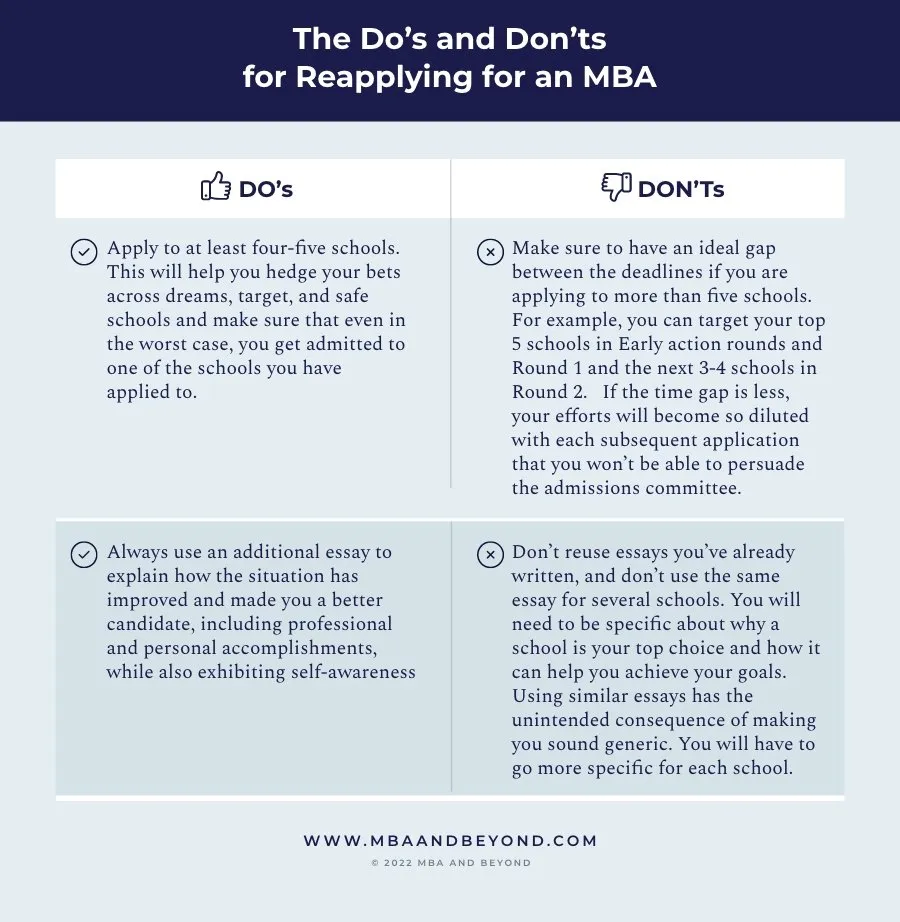
MBA Reapplication: How Can You Strengthen Your Application This Time?
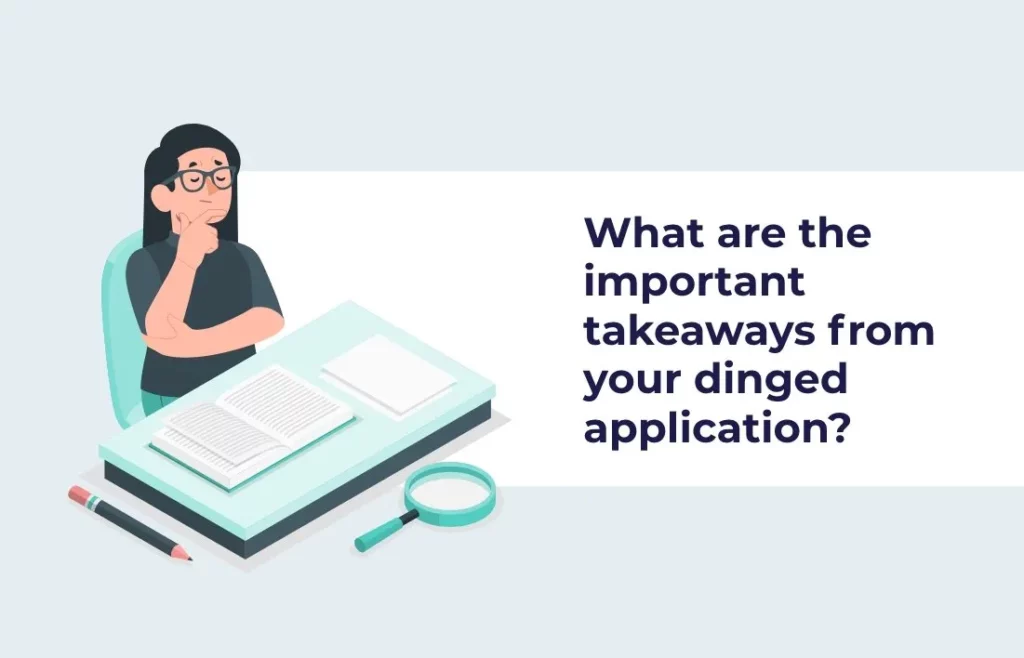
If you reapply within a year after your initial application, most B-schools allow you to submit a shorter version of the original application. Many reapplicants opt to reuse their prior year’s essays and reference letters, and that’s acceptable.
However, it’s advisable to consider a revised version. After all, your essays might have contributed to your initial rejection. Therefore, putting effort into introspection and refining your application often results in essays that are notably different from their original counterparts.
Hear the story of this reapplicant and see the difference he made in his reapplication.
Pause before hitting reapply on your MBA! Do you really consider those schools your best fit?
Check if your profile (grades, experience, goals) aligns with theirs, and if the school’s culture matches your personality and ambitions. Finding the right program is key, so explore new options if needed!
For those applying again, choosing the right time is key. Applying early can be a smart move to highlight new job successes or get solid references sooner. However, rushing might backfire if you need more time to achieve and show off noteworthy results in a new position.
REVIEW YOUR APPLICATION AND MAKE ANY NECESSARY MODIFICATIONS
In the application process, the final and most significant stage is analyzing the application to ensure that we don’t overlook any important points.
Acing your MBA reapplication requires a thorough self-assessment. Analyze your previous application materials, essays, and any feedback to identify areas for improvement, like your GMAT score, essay content, or career goals. Don’t go it alone! Seek external feedback from alumni, current students, or admissions experts. Their insights can be invaluable in strengthening your MBA reapplication candidacy.
We review applications using a three-fold approach, acting as neutral observers to ensure your reapplication is comprehensive and showcases your strengths from every angle.
Considering the increasing difficulty of securing admission to a top MBA school, we strongly advocate seeking assistance from someone well-versed in the process. Collaborating with an experienced individual provides insights that may elude you, offering a distinct advantage over other reapplicants.

We hope this article provided you with some comfort and knowledge. Experiencing rejection is undoubtedly disheartening, and having been in your shoes before, we understand the toll it takes on an applicant. Rest assured, we’re here to support you through every step of the process.
If you’d like, you can get on a free profile evaluation with our Experts to get in-depth, extensive, and honest feedback on where you stand and how you should strategize your applications.
Want to ace your MBA applications?
Not sure how to strategize your MBA application?
Leave a Reply
Your email address will not be published. Required fields are marked *
Articles You Might Like

Should an International Candidate go for an INSEAD R3 MBA?

Top MBA programs starting in January 2024
Upcoming Events

Unlock Your MBA Dreams: Scholarships & Financing Strategies!
May 2, 2024 | 9:00 pm – 10:00 pm
UPCOMING EVENT: Unlock Your MBA Dreams: Scholarships & Financing Strategies!. Register now
MBA Essay Tips and Examples
Crafting a successful MBA application essay can be challenging. Click the icons below to read our expert advice on how to approach each business school's application essays, plus read illustrative sample essays to inspire you.
Berkeley Haas
Cambridge Judge
Chicago Booth
Columbia Business School
Cornell Johnson
Dartmouth Tuck
Emory Goizueta
Georgetown McDonough
Harvard Business School
London Business School
Michigan Ross
Northwestern Kellogg
Oxford Saïd
Stanford GSB
Texas McCombs
Toronto Rotman
UCLA Anderson
UPenn Wharton
Washington Foster

IMAGES
VIDEO
COMMENTS
A nearly identical question is used for the optional essay prompt for most other top MBA programs, often with a limit of just 250 or 300 words. The change in wording - and word limits - makes it clear that business schools do not want extra essays. They only want to hear about extenuating circumstances. Considering the fact that anything ...
2) Be specific. Most reapplicant essays ask candidates to demonstrate growth. Remember, past actions are the best indicator of future performance, so be sure to share very specific examples of growth. 3) Consider both personal and professional growth. While of course it would be great if you were promoted since your last application, this is ...
MBA Reapplicant essays help the admissions committee understand how you have evolved personally and professionally between the time of your rejection and your reapplication. For example, Columbia Business School requests that applicants detail their progress and reiterate their MBA goals:
So, you didn't get into your target schools the first time around. We know it's tough to deal with rejection, but you're not alone. Top MBA programs are very competitive, and even the best candidates face rejection in their application process. For example, Harvard Business School received 9,773 applications in 2020-21, of which only 1010 candidates were able to enroll. UPenn's Wharton ...
The success of reapplicants is actually a kind of survivorship bias — the pool of people who are motivated to reapply are also the ones who are willing to take steps to strengthen their application and candidacy, including things like: Retaking the GMAT and getting a better score. Earning a promotion at work. Improving their post-MBA career ...
A strong, well-considered, and effectively executed reapplication strategy can win you that second chance. By following these three steps you can beat the competition for reapplication spots. STEP #1: Reevaluate & Improve Your Candidacy. STEP #2: Understand Your Schools' Reapplication Procedures. STEP #3: Reapply!
3. Get Vulnerable. Most MBA admissions essay prompts are written with the goal of getting to know as much about you as possible in the shortest number of words. To do that, you're going to have to share real things from your life — to get personal, intimate, and vulnerable. Do not shy away from this.
Free MBA Waitlist / Reapplication Essay Samples . See below some Waitlist/reapplication MBA essay samples: Since my previous application to Tuck in January 2021, I have worked towards achieving my long-term goal of globally expanding the reach of my family firm. In my new role as Assistant
This collection of 50 successful HBS and GSB essays, with smart commentary, can be downloaded for $60. They are two of the most selective schools, routinely rejecting nine or more out of every ten applicants. Last year alone, 16,628 candidates applied to both schools; just 1,520 gained an acceptance, a mere 9.1% admit rate.
Instead, tell the schools about your growth or goals. 2) Be specific. Most reapplicant essays ask candidates to demonstrate growth. Remember, past actions are the best indicator of future performance, so be sure to share very specific examples of growth. 3) Consider both personal and professional growth.
If you are a business school reapplicant, you need to do a few key things before you submit a new application. ... 2023-2024 MBA Essay Tips. Berkeley Haas School of Business Essay Tips and Examples; ... Cornell Johnson Graduate School of Management Essay and Examples; Dartmouth Tuck School of Business Essay Tips and Examples;
The following analysis examines the admissions essays for Columbia Business School. The Columbia MBA essay questions below are for the 2023-2024 admissions season. You can also review essay topic analyses for other leading MBA programs as well as general Essay Tips to further aid you in developing your admissions essays.
Here's an example of a well-articulated post-MBA goal: "Post-MBA, I intend to work at a top-tier management consulting firm such as Bain, McKinsey, BCG or Deloitte in a financial service consulting role. ... If the school has a reapplicant essay, make sure you discuss how you reacted to the rejection and rebuilt your application. Specifically ...
4. A combination of all 3. Step #2: Fix what went wrong. 1. Either improve your competitiveness or apply to programs where you are competitive. 2. Present yourself effectively. Use specifics, anecdotes, and examples to support your main points, add distinctiveness to your application, and engage your readers.
Present your ideas in a clear and organized manner. Take the time to proofread and edit your essay thoroughly, or ask someone else to review it for you. A polished essay reflects your attention to detail and professionalism. Stay Positive and Confident: Maintaining a positive and confident tone throughout your reapplicant essay is essential.
Caught in the cross-fire of an unanticipated ambush, Stark's body (and heart) is riddled with shrapnel. A hare's breath away from death, a device connected to his heart (powered by an external battery) keeps him alive, barely. Trapped in a cave and held hostage by terrorists, he's forced to build them a weapon of mass destruction.
Instead, tell the schools about your growth or goals. 2) Be specific. Most reapplicant essays ask candidates to demonstrate growth. Remember, past actions are the best indicator of future performance, so be sure to share very specific examples of growth. 3) Consider both personal and professional growth.
See our blog post on Optional Essay Do's and Don'ts for guidance. Reapplicant Essay: How have you enhanced your candidacy since your previous application? Please detail your progress since you last applied and reiterate how you plan to achieve your immediate and long term post-MBA professional goals. (Maximum 500 words).
MIT Sloan School of Management Essay Tips and Examples. July 3, 2023. Jeremy Shinewald. Rather than framing its required application essay as a traditional "essay," the MIT Sloan School of Management instead requests that applicants submit a "cover letter," including even the standard formal correspondence elements of an address and ...
Harvard Business School Essay Analysis, 2023-2024. Applicants to Harvard Business School (HBS) have incredible leeway in their essay (with respect to both topic and length) to write about whatever they believe is most important for the admissions committee to know about them, beyond what is conveyed via the other elements of their application.
If you reapply within a year after your initial application, most B-schools allow you to submit a shorter version of the original application. Many reapplicants opt to reuse their prior year's essays and reference letters, and that's acceptable. However, it's advisable to consider a revised version. After all, your essays might have ...
MBA Essay Tips and Examples. Crafting a successful MBA application essay can be challenging. Click the icons below to read our expert advice on how to approach each business school's application essays, plus read illustrative sample essays to inspire you.
MBA Career Essay MBA Application Mba Research Sample The Mba Decision mba career essay abstract the purpose of this paper is to construct and support an. Skip to document. University; High School. ... Mba Reapplicant Essay. Course: Essay (21265) 16 Documents. Students shared 16 documents in this course. University: Five Branches University. AI ...